Inside Read: A new climate on how schools handle sexual assault

In December 2012, Tallahassee police were called to an off-campus apartment around 2 a.m. after a Florida State female student said she was sexually assaulted. The alleged assailant was later identified as a Florida State freshman quarterback. Earlier this week, University of Florida Police were called to an on-campus residence hall for an alleged incident that took place around 3 a.m. A female student accused a University of Florida freshman quarterback of sexual assault.
Both of these cases involved one of the state's flagship schools, powerhouse football programs and emerging stars. Neither player was arrested or charged, although the case at Florida State is under Title IX investigation and the case at Florida is ongoing. But how drastically different each university has handled the cases, just two years apart, shows a shift in how schools are dealing with accusations of violence against women.
In the case of Florida State quarterback Jameis Winston, Tallahassee police bungled the investigation, the athletic department seemingly looked the other way and Winston went on to lead the Seminoles to a national championship. It took a flurry of other off-field shenanigans -- stealing crab legs and screaming an obscenity from atop a table in the middle of campus -- for the university to finally hold Winston out of a football game. And that was only after the president’s office intervened.
"Florida State sent the flares up that (they) are completely inept and corrupt in how (they) handle these cases," said Katherine Redmond Brown, the founder of the National Coalition Against Violent Athletes. "Florida handled it a lot better. I think they handled it the way that college football is beginning to handle it."
In the case of Florida freshman quarterback Treon Harris, the university suspended him from the team within 24 hours. The investigation is still ongoing, and Harris' lawyer has appeared in multiple media reports saying that he’s confident his client won’t be arrested.
• Harris investigated for sexual battery, suspended indefinitely
“This really shows how poorly handled the Jameis Winston case was,” said Don McPherson, a College Football Hall of Fame quarterback at Syracuse who has been a prominent educator and speaker on domestic violence for three decades. “This (immediate suspension) is what should have happened.”
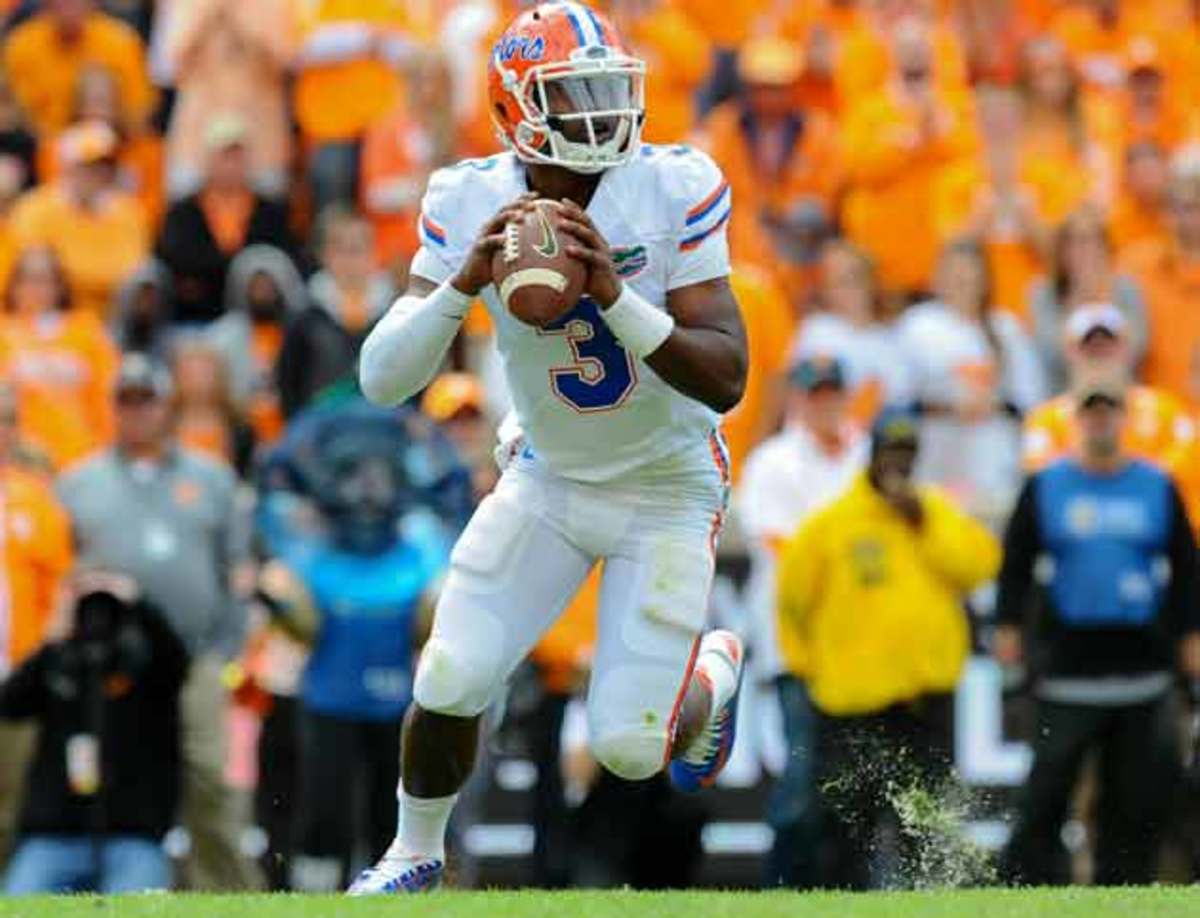
So what changed in the two years from Winston to Harris? What led two football powers to take such drastically different courses regarding sexual assault allegations? There's a confluence of reasons. McPherson theorizes one of them is Title IX, although in a much different context than the 1972 federal legislation is typically linked to athletic departments for equal funding for men's and women's sports.
Surely, the flurry of high profile NFL domestic violence cases have heightened public awareness and applied pressure on Florida. But McPherson points to a "Dear Colleague" letter that the Department of Education sent out in April 2011. The letter brought up how under Title IX universities could lose tens of millions in federal funding if they didn’t have an extensive system in place for dealing with sexual violence complaints. Florida State only now appears concerned about Title IX ramifications, as their current investigation would appear to indicate.
When McPherson visited with the Alabama football coaches recently before speaking to the team, he told them flatly: “You can sit here and call b.s. on me, but the Dear Colleague letter and how it impacts your campus, that federal funding is worth more than your TV contract,” he told The Inside Read. “Schools are more aware of the legal ramifications of sexual assault complaints.”
Redmond Brown is still skeptical of Title IX’s impact on campus in regard to violence against women, as she says it gives the university a chance to check requirement boxes and do things right on paper. “As far as a real commitment to ending it and to see violence against women as an epidemic, I don’t think it’s there yet,” she said.
Make no mistake, Florida is not exactly a beacon of athletic integrity. It endured a string of high-profile legal trouble under former coach Urban Meyer, including a 2010 arrest of star Chris Rainey for aggravated stalking. Rainey allegedly sent a text to his girlfriend that included the words, “time to die.” He returned five games later for a pivotal showdown against Georgia. He pleaded guilty to a misdemeanor stalking charge and led the Gators to a 34-31 win with 241 all-purpose yards.
While Rainey’s case differed from those against Winston and Harris, it’s hard to imagine him returning to the field in the same manner in this new climate. Four years later, the Gators look proactive and progressive in comparison to both Florida State and their previous actions. Florida’s case is especially intriguing considering the tenuous state of the football program. Although the Gators are 3-1, they need a strong season to save the job of coach Will Muschamp.
Harris came off the bench on Saturday to lead the Gators to a stirring 10-9 comeback victory over Tennessee, seemingly securing himself as the starter and quarterback of the future. But Harris will be suspended until his case is resolved, a situation Florida considered severe enough that its president made himself the focal point of the decision. Muschamp’s weekly Monday press conference was postponed with the thought being that the situation was too serious to talk about football. President Bernie Machen’s release on Monday hints at wanting to comply with Title IX sexual assault standards: “We have no tolerance for sexual assault on our campus. The university is committed to providing a safe and inclusive environment for every member of the UF community. We must strive to protect all of our students from sexual harassment and assault, and do everything in our power to promote a safe learning environment.”
That’s a stark contrast to what happened in the Winston case, where the more details emerged, the more the university appeared to be concerned with the football team. “Clearly they have no standards for behavior for student-athletes,” McPherson said. “This guy was on film stealing from a local store and was standing on a table on campus (screaming lewd obscenities). If he were a frat guy he’d be kicked out of school by now.” (Other schools appear to be paying close attention. On Wednesday, Kentuckyindefinitely suspended freshman defensive end Lloyd Tubman after he was arrested and charged with first degree rape.)
If Harris isn’t charged, it will be an interesting test for the school’s administration when -- or if -- he will be allowed back on the team. The immediate suspension shows the conversation has changed on campus. Said University of Cincinnati professor Bonnie S. Fisher, author of extensive studies on campus sex crimes: “Machen also sets the bar for other college/university administrators who unfortunately may be faced with a similar situation down the road."
Three-and-out
1. Missouri's Maty Mauk follows in footsteps of record-setting brother
Missouri’s Maty Mauk spent time with his hero during his team’s bye last week, the person who inspired him to be a quarterback. All he had to do was drive less than three hours away to work on his game with his older brother, Ben, who coaches at Glendale High in Springfield, Mo., with their father, Mike.
Like his younger brother, Ben Mauk was a record-setting quarterback at Kenton (Ohio) High, and went on to play at Wake Forest and Cincinnati. He set the national career passing yards record, only to have his younger brother later top it nine years later by nearly 1,600 yards (17,364 yards). “People pay thousands of dollars to go workout with people for a couple of hours,” Mauk told The Inside Read, “and I can get as much as I want for free.”
The gunslinging redshirt sophomore’s tune-up came at an opportune time with Missouri in control of its destiny in the SEC East entering Saturday’s critical home game against Georgia. Mauk will once again depend on his brother’s teachings in arguably the biggest start of his young career. “It’s a bunch of little things he did,” Mauk said, “but it’s really taken my game to another level.”
• JOHNSON: Michigan recruits in Hoke limbo
After making four starts last season because of injury, the 6-foot, 200-pound Mauk has thrown for 1,110 passing yards with 14 touchdowns and four interceptions this season in his first as the Tigers’ starter. But he’s quick to mention his older brother’s role in his success. After Ben Mauk’s playing career was over in 2010, he turned down college coaching job opportunities, like joining Brian Kelly, his former coach at Cincinnati, and high school gigs in the Columbus, Ohio area, to keep working with his younger brother. He was his offensive coordinator when Maty broke his national passing yards record.
Maty credits his older brother for teaching him to keep his eyes up field and how to read safeties. “It was unbelievable how much better I got week-by-week with him there,” he said.
Unbelievable is what the younger Mauk calls his brother as a player. In his lone season at Cincinnati, Ben Mauk led the Bearcats to a 10-3 record, which he capped off with a win in the PapaJohns.com Bowl and was named MVP.
The younger Mauk admits he might have a little bit more speed than his older brother, but knows he isn’t nearly as quick as him mentally. “Just look at the tape of what he could do with his eyes looking people off,” Mauk said. “I’m still trying to get better at that.”
Mauk is undoubtedly more of a risk-taker than his brother. He’s been compared to Brett Favre for his knack for making big plays, but said that’s been “pushed” on him. Instead, Mauk prefers to simply describe himself as a “playmaker.”
“I’m not going to let something affect me like when I throw an interception,” Mauk said. “People might get down, but I do not care. At the quarterback position, everybody’s looking at you. If I throw an interception and I’m down, it’s going to take the whole offense down, really the whole team. You need to bounce back. I’m going to take shots when they’re there.”
The Favre talk is flattering to Mauk, but he’s already got his hero. His brother, who is the first person he calls after games to discuss what he could have done better.
“Nobody else in the country I would rather go work out with,” Mauk said. “That’s who I really want to make me who I am.”
2. Penn State’s Franklin lives for his new job
While some college coaches say they live in their offices, Penn State’s James Franklin actually resided in his for seven months until he finally moved into his new house late last month. “I haven’t really gotten out a whole lot,” Franklin told The Inside Read.
After he left Vanderbilt for Penn State in January, Franklin lived in a hotel paid for by the university. But once that ran out, Franklin elected not to get an apartment because his wife and two young daughters were still living in Nashville (they have since moved into the new house). “It just didn’t make sense for me to go rent an apartment here and go sit there by myself at night from 11 o’clock until 5 in the morning,” Franklin said.
Instead, Franklin went to Target and bought bedding that he stretched out over couches in his office’s lobby to sleep each night. His frantic pace since his arrival in State College made sleeping easy and he continued to get up naturally at 5. “I’d roll over, go downstairs, get in the locker room and shower,” Franklin said.
It’s no wonder that Penn State athletic department employees have often tweeted about Franklin being in his office so early. He also ate dinner at the team’s training table during the seven months he was living in his office.
“It was ideal,” Franklin said with a laugh. “It really was.”
3. BYU reeling after Taysom Hill’s season-ending injury
When BYU offensive coordinator Robert Anae spoke with The Inside Read on Sunday morning, he was looking over his game plan for Thursday night’s game at Central Florida. “It looks a lot like Taysom Hill’s,” Anae said.
The only problem is Hill won’t be playing after the star quarterback suffered a season-ending broken left leg in a 35-20 loss to Utah State last Friday night. It not only ended his darkhorse Heisman Trophy candidacy, but also spoiled the Cougars’ remote chances at making the College Football Playoff. Anae was still shaken talking about Hill’s injury some 36 hours after it happened.
“It’s hard for the whole team,” Anae said. “He meant so much.”
The dual-threat Hill was running right in the second quarter when Utah State safety Brian Suite awkwardly landed on Hill’s lower leg while tackling him. Hill also suffered a season-ending knee injury against the Aggies two years ago. “The game is weird,” Anae said. “You fall just a little one way. It just folded up the wrong way.”
Hill had successful surgery Saturday, but will be unable to put weight on his leg for about six months, according to Anae. “His spirits are really good,” Anae said. “That kid is resilient. He’s got a mindset that he’ll heal up and take it from there.”
It’s a short week for Anae to work with Hill’s successor, Christian Stewart, who is also a dual-threat quarterback. A junior college transfer, the 6-2, 208-pound senior had attempted just two passes prior to Hill’s injury. He completed 10 of 29 passes for 172 yards with three interceptions after replacing Hill against Utah State.
• STAPLES: What can we take away from wild Week 6?; Punt, Pass & Pork
“We’ve got to find stuff that flows easy with Christian,” Anae said. “This will be our first game in that discovery phase. We tried like crazy in the game planning to do things that are more Christian friendly, but the truth of the matter is I’m looking at the game plan sheet and I don’t know if one thing’s really changed.”
Anae is optimistic about Hill’s return for his senior year next season. So much, that Anae once again mentioned him in the same breath as one of Anae’s former teammates at BYU.
“He’s similar to Steve Young, a guy that runs around and makes things happen and is super physical,” Anae said. “Taysom is probably the best that I’ve been around along those lines.”
The Blitz
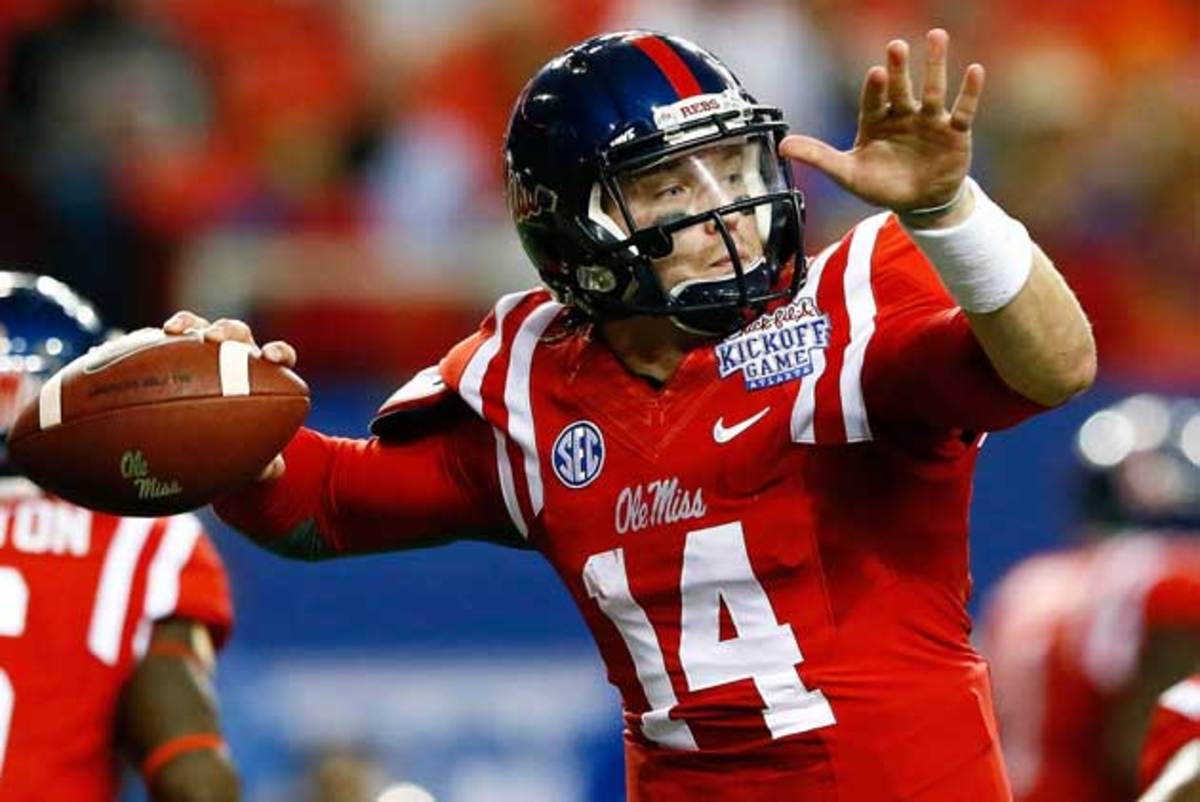
• Ole Miss quarterback Bo Wallace has led the SEC in volatility the past three seasons, interspersing moments of brilliance with dreadful decisions. But on Saturday, the most surprising part of his performance in Ole Miss’ 23-17 upset was summed up by Ole Miss co-offensive coordinator Dan Werner’s comment that Wallace didn’t make a bad decision all game. He finished 18-for-31 with three touchdowns and no interceptions. “He’s just got to keep on doing it,” Werner said.
Even when Mississippi’s offense was struggling in the first half, Wallace kept his patience in sideline conversations with Werner. “Don’t worry about it coach,” Werner recalls being told by Wallace. “Everything’s going to be fine.”
• Ole Miss, Mississippi State share cover of this week's Sports Illustrated
As goal posts were dragged across campus in Oxford, Werner planned to indulge in a few well-deserved beers before going to bed at 10:30 p.m. “I’ve got to get ready for A&M, then Tennessee, LSU and Auburn,” Werner told The Inside Read after the game. “You know how this league is.”
The best news for Werner appears to be that Wallace has finally settled down heading into the thrust of SEC play. Since throwing three interceptions in the first half of Mississippi’s season-opening win over Boise State, the gunslingingredshirt senior has tried not to force throws. All week leading up to the Alabama game, Werner told Wallace to think of it as a heavyweight fight.
“You can’t all the sudden throw a haymaker out there because they’ll punch you in the nose,” Werner said of Alabama’s defense. “We were going to be smart with it and just keep on banging away. He did and he finally got a couple of shots there at the end and took advantage of them.”
• The avalanche of Top 25 teams losing on Saturday overshadowed a glaring storyline from last week: Oregon is in trouble. Second-year coach Mark Helfrich has lost to Arizona in consecutive seasons and the Ducks haven’t been impressive since their blowout of Michigan State. They needed a no-call on an obvious pass interference to hold off Washington State, 38-31.
“Their defensive scheme is really unsound,” said an assistant coach whose team faced the Ducks. “They got away with it in the past because they were always so far ahead on the scoreboard, but I’ve always said, ‘Put them in a tight game because they’re not going to be able to hold up defensively.’”
The coach identified a lack of solid personnel on defense as even a bigger problem than the Ducks’ terry cloth offensive line. And there are also scheme issues, which were apparent in last Thursday’s 31-24 loss to Arizona. The assistant broke down in layman’s terms exactly what the issues were with Oregon under first-year defensive coordinator Don Pellum: “He lined up in the same f----- thing all night. Didn’t they practice more than one thing? It was unbelievable.”
Here’s a more technical explanation: “Arizona is obviously running zone-read, and every time they handed the ball off, the back would roll it right back into the backside C gap because both inside linebackers were running to the front-side A gap,” the assistant said. “If you’re going to play that front, the backside linebacker goes to the quarterback. He goes out the backdoor. That’s Football 101. Arizona was rolling it back because Oregon on the backside was two-on-two with those receivers, who were running slant fades and two-man routes, which pulled them out of the play. So the running back rolled it back to the C gap because there was no defender there. He finally starting bringing pressure with five minutes left in the game, which is what you to do to that quarterback I believe.”
• RICKMAN: Mississippi school soar in this week's Power Rankings
• Defensive coordinator Art Kaufman finally got home from California’s wild 60-59 victory over Washington State at 5:30 a.m. on Sunday. Even then, he was still trying to figure out how the Bears won despite surrendering an NCAA single-game record 734 passing yards and six touchdowns to Cougars quarterback Connor Halliday.
“It’s hard to believe,” Kaufman told The Inside Read on Sunday morning. “That’s the doggonest thing I’ve ever been involved in.”
Kaufman has seen plenty during his 32-year coaching career. But nothing like the last three zany weeks for Cal, which is off to a surprising start at 4-1. In their two previous games, the Bears lost to Arizona 49-45 on a 47-yard Hail Mary on the game’s final play and then beat Colorado 59-56 in double overtime. On Saturday, Washington State drove all the way to the Cal 1, where it was stopped once and then missed a 19-yard field goal with 19 seconds remaining.
“It’s amazing,” Kaufman said. “Our kids just keep playing. They’re learning to finish. It’s a process of growing from where we were to where we’re going to get to. Just winning is obviously progress.”
Kaufman’s young defense used several players against Washington State, who entering the game had played less than a handful of snaps all season. One of them was called up from scout team just four days before according to Kaufman. But somehow it’s worked for Kaufman, a widely respected defensive mind, who spent the previous season as defensive coordinator at Cincinnati. He continues to stress the importance of each play to his defense.
Said Kaufman, “It’s the difference between us being undefeated.”
Behind the Scenes at Mississippi State
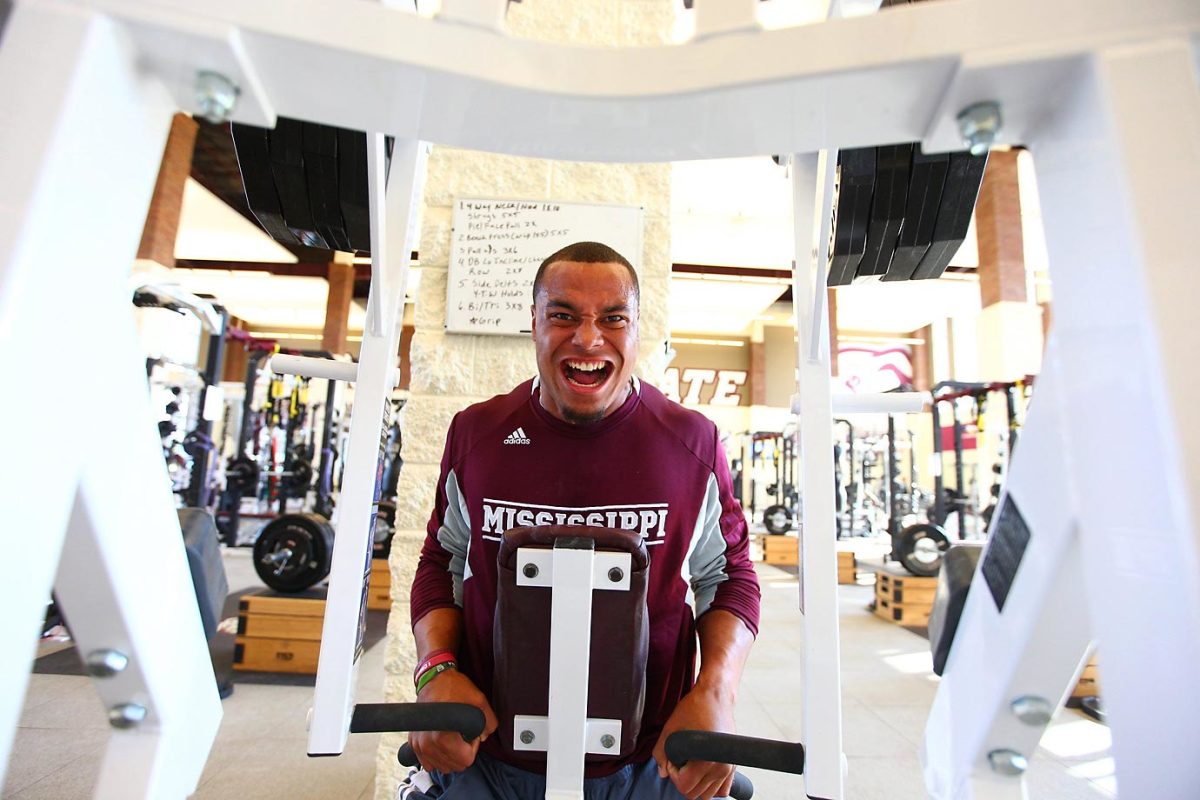
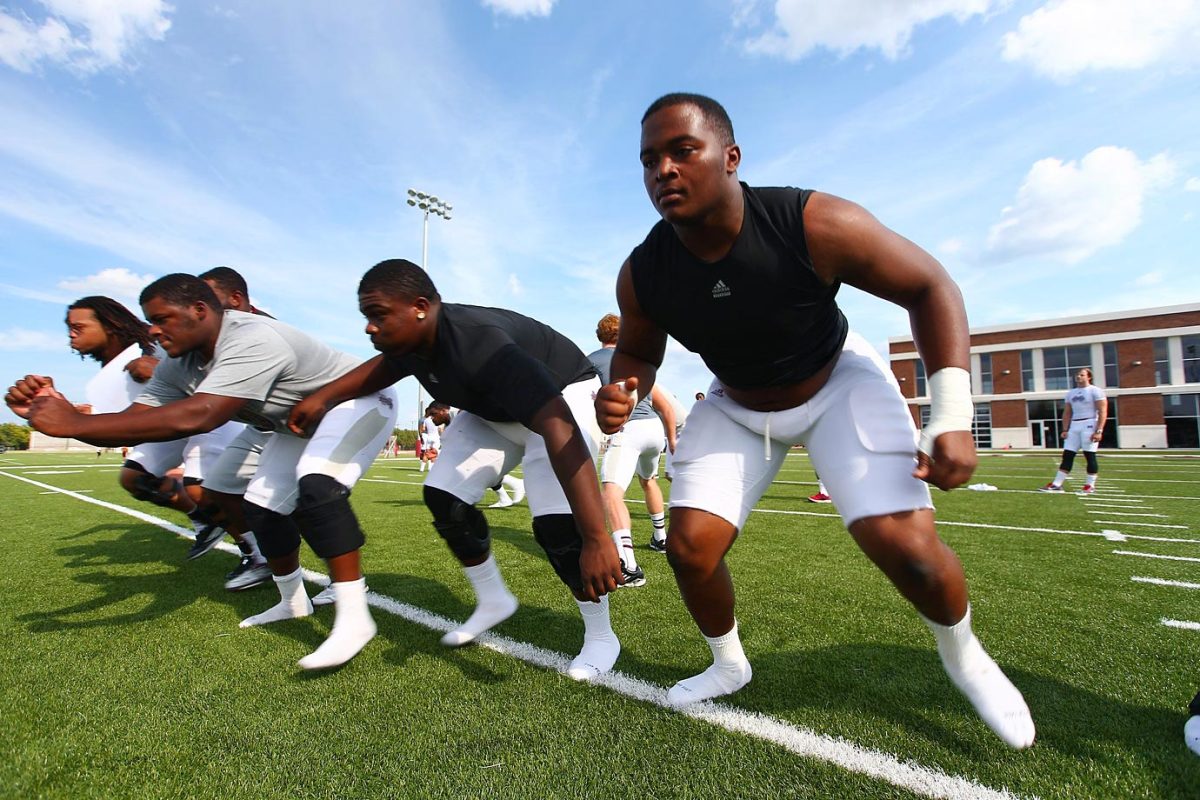
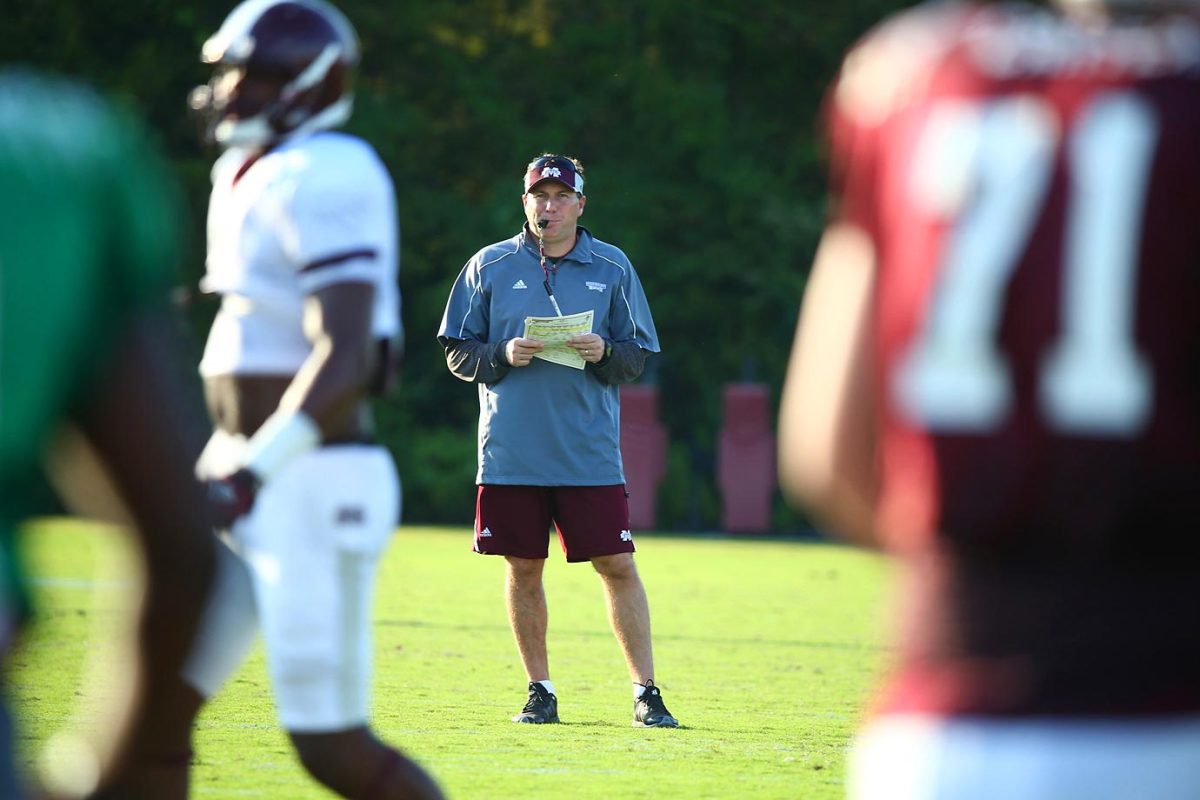
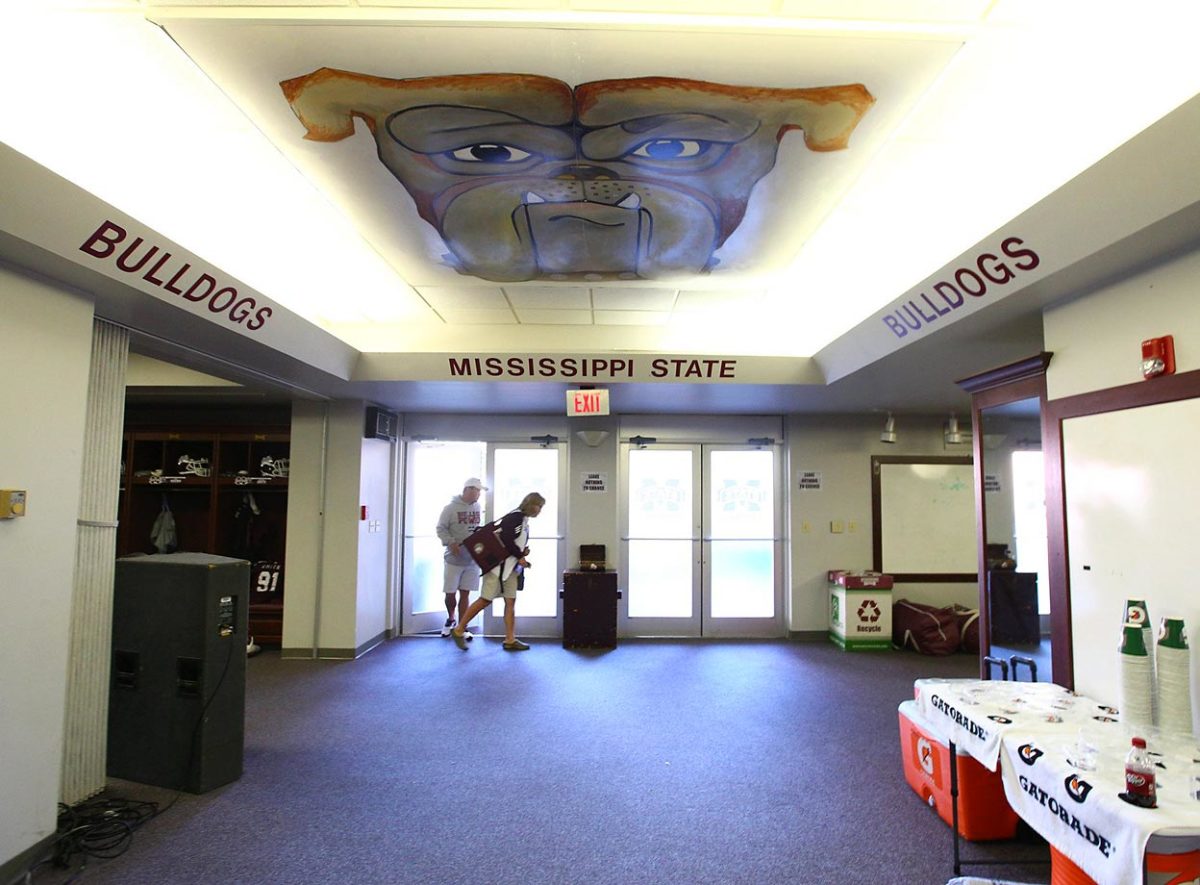
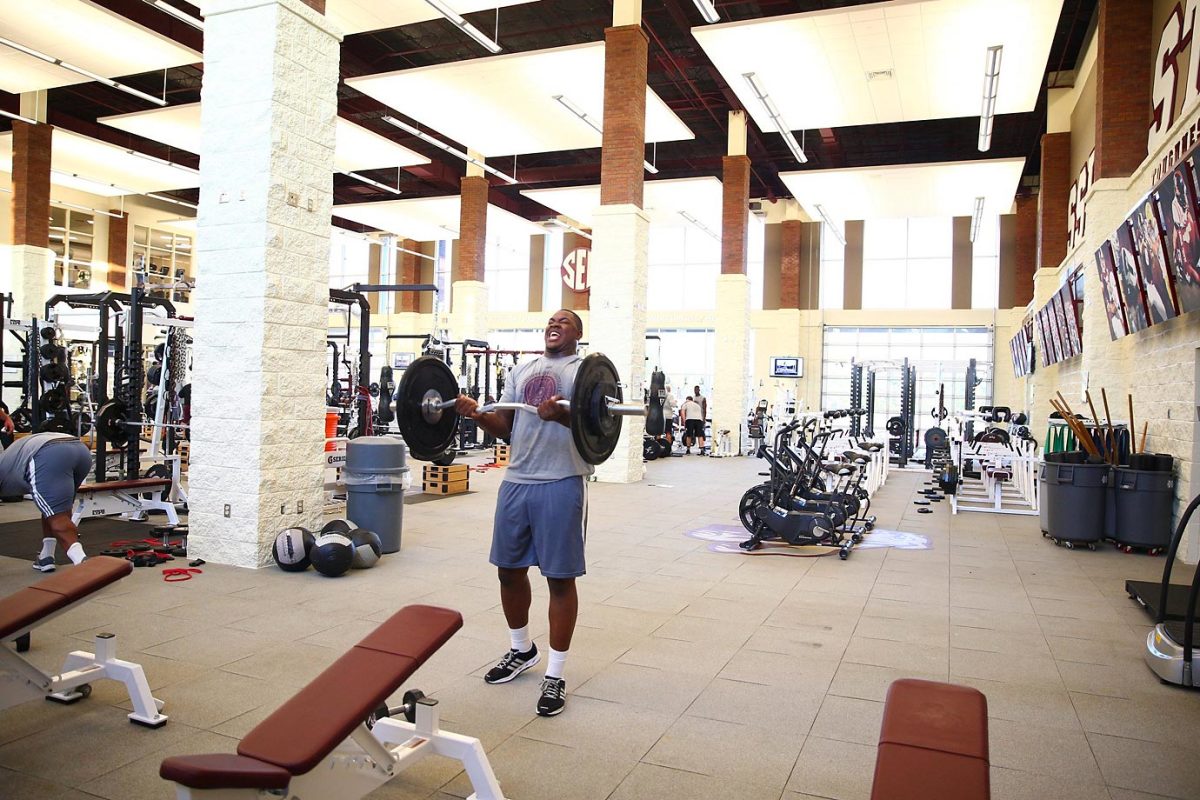
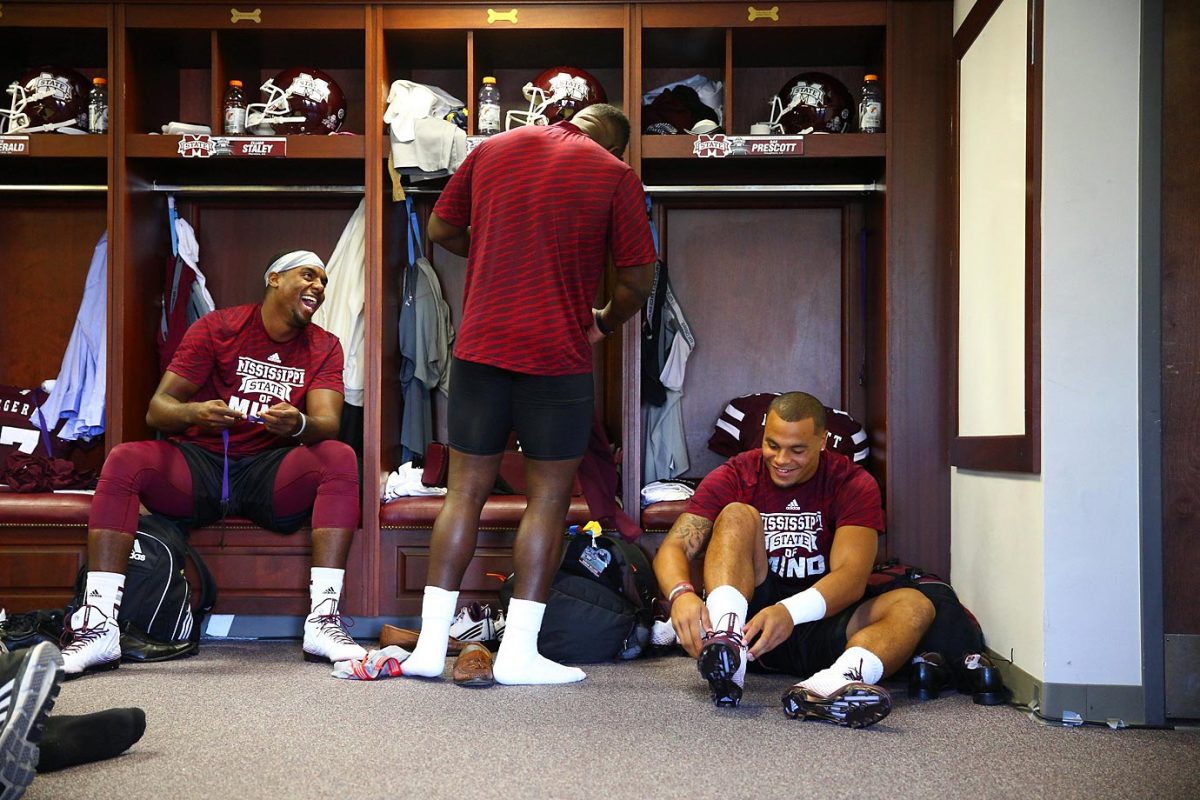
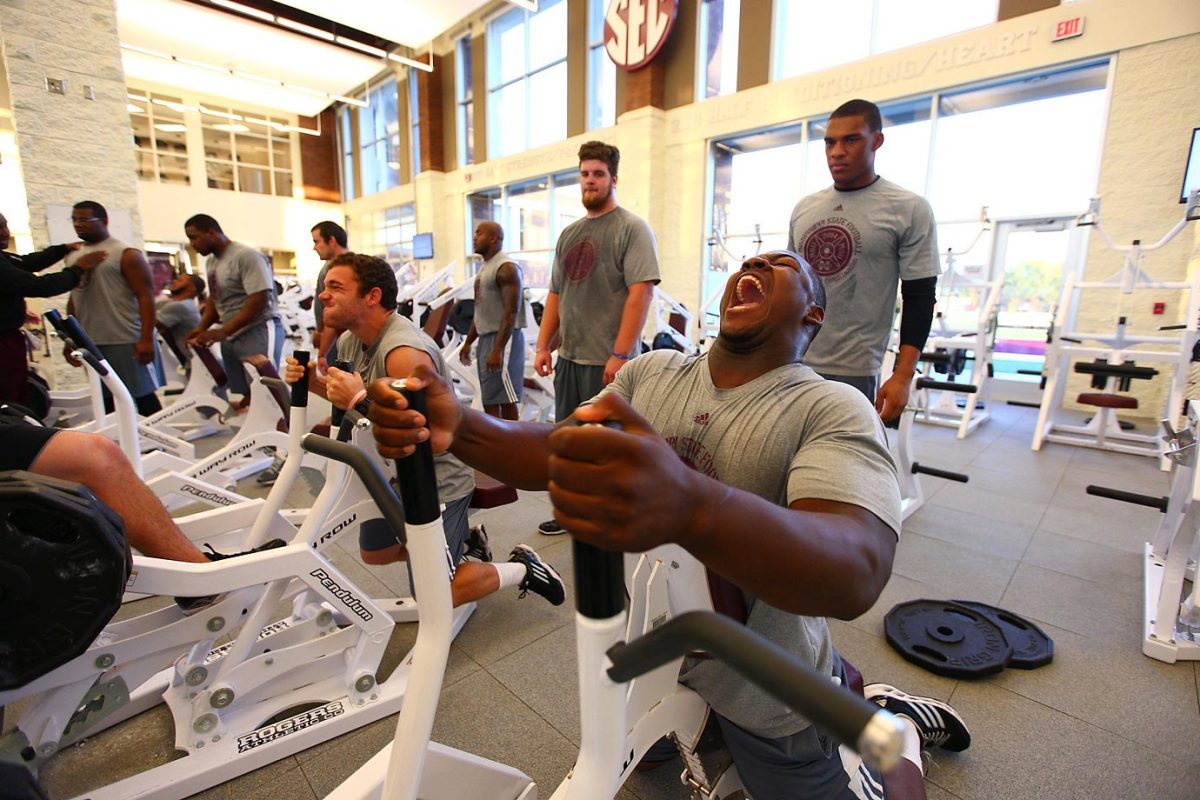
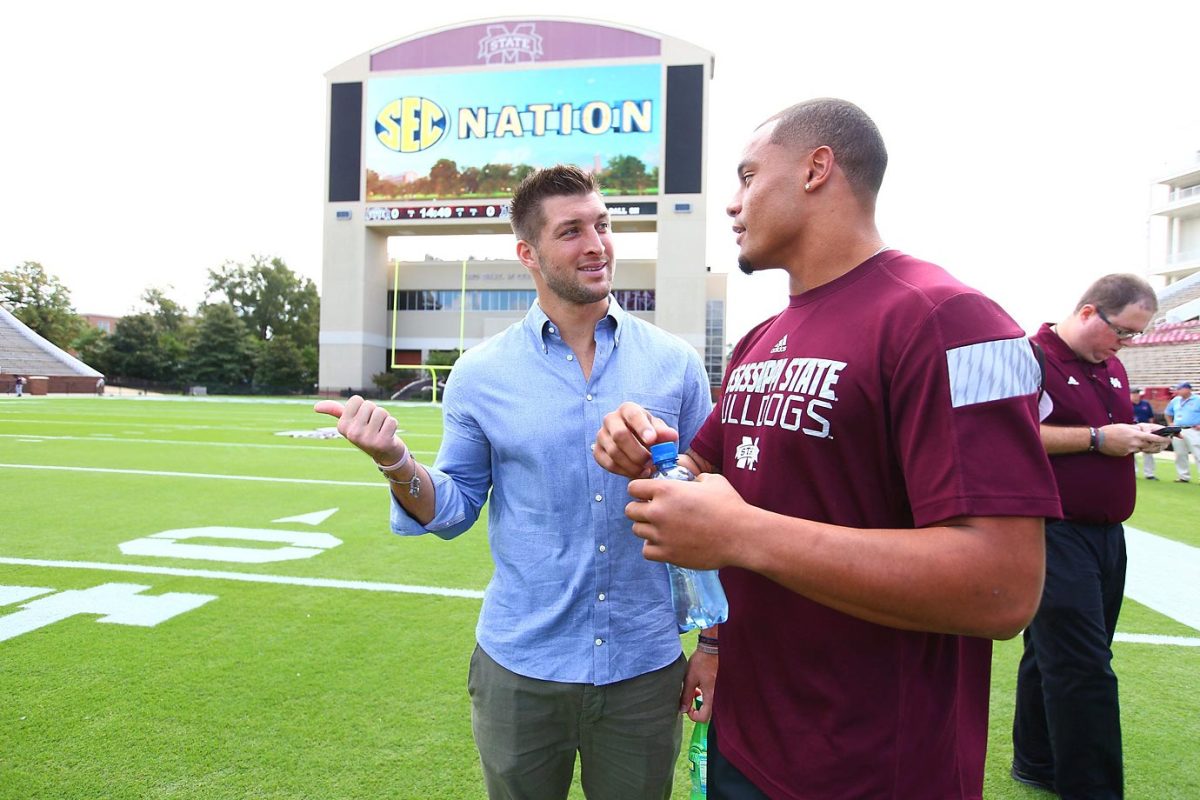
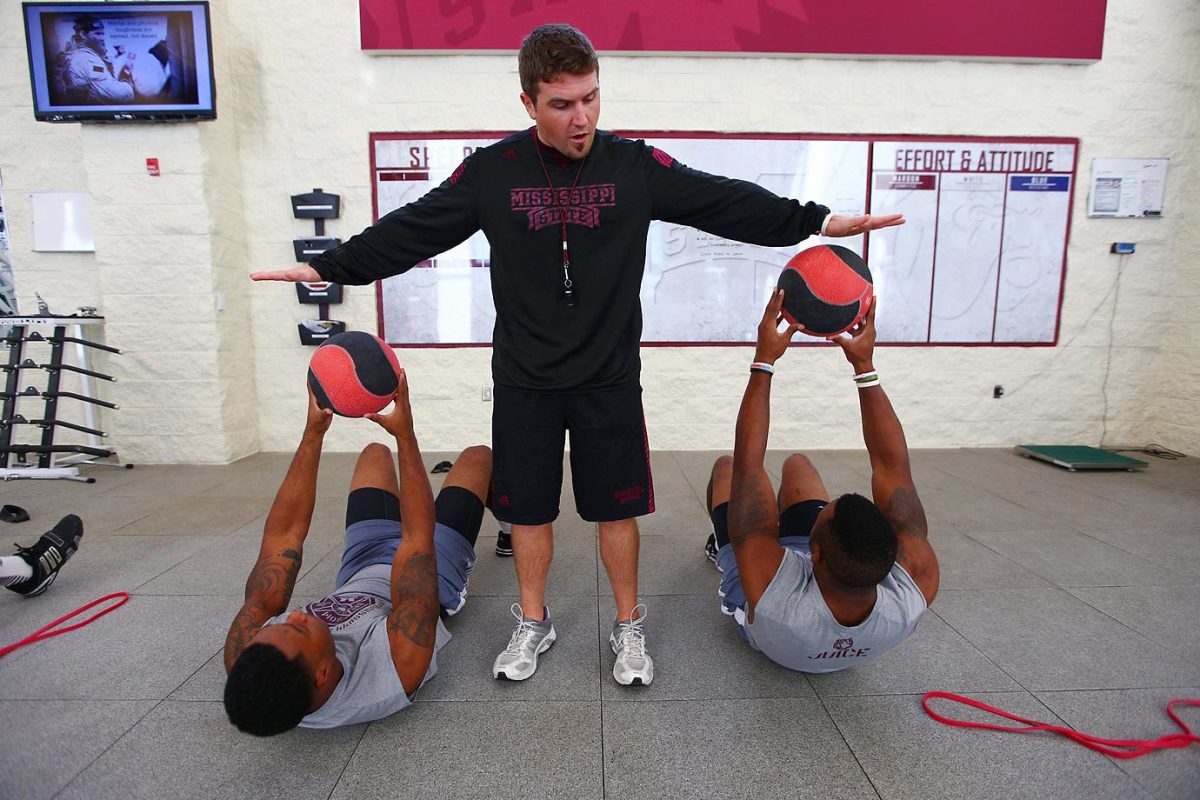
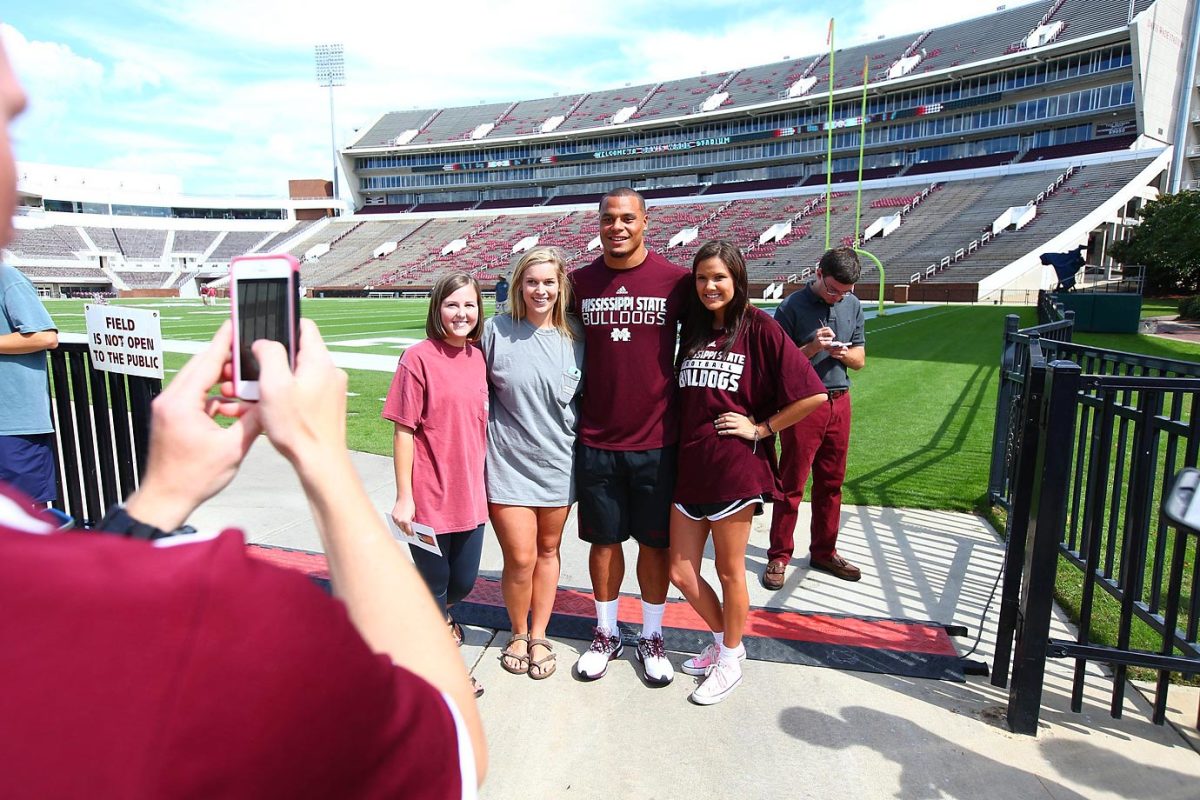
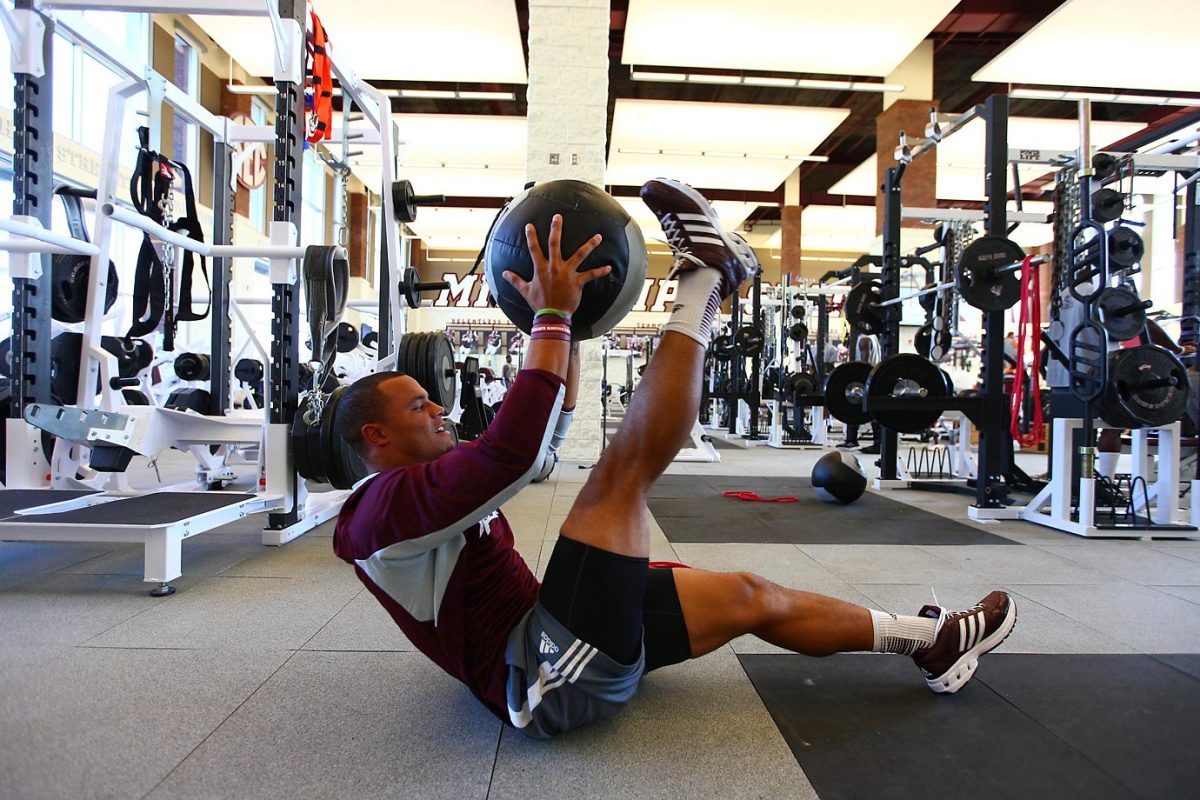
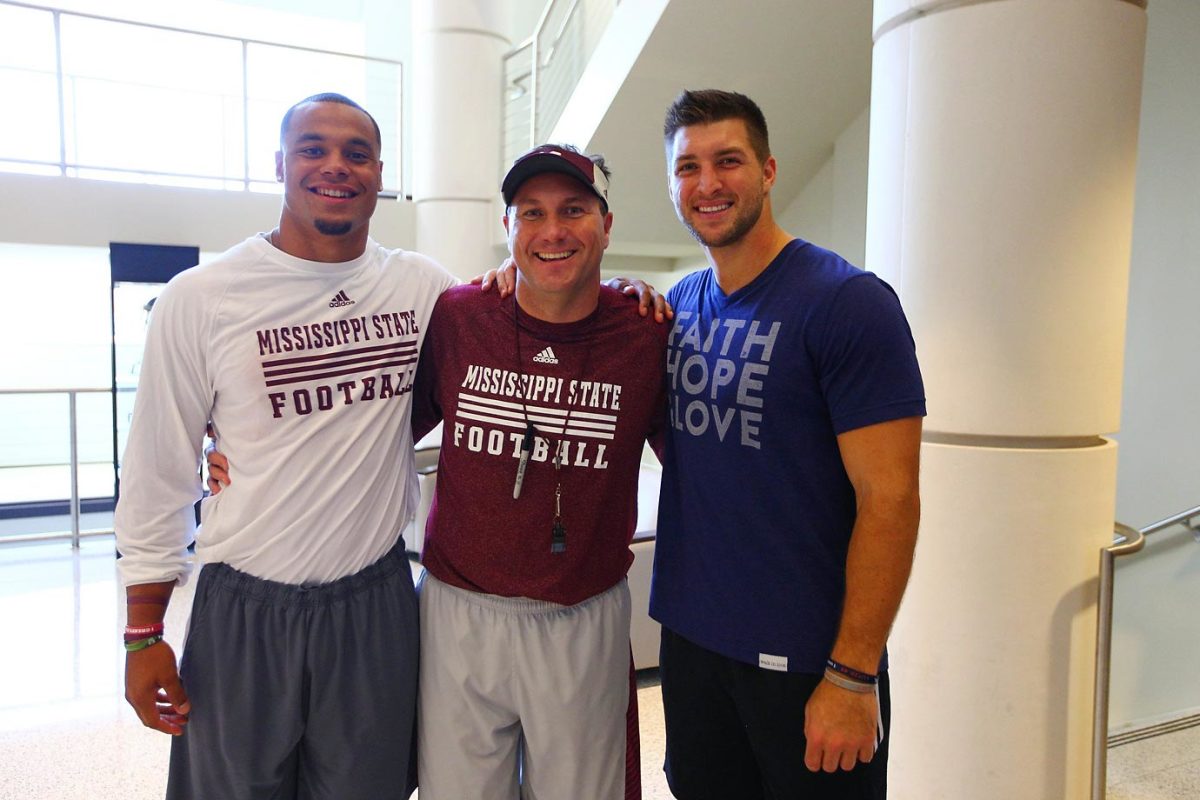
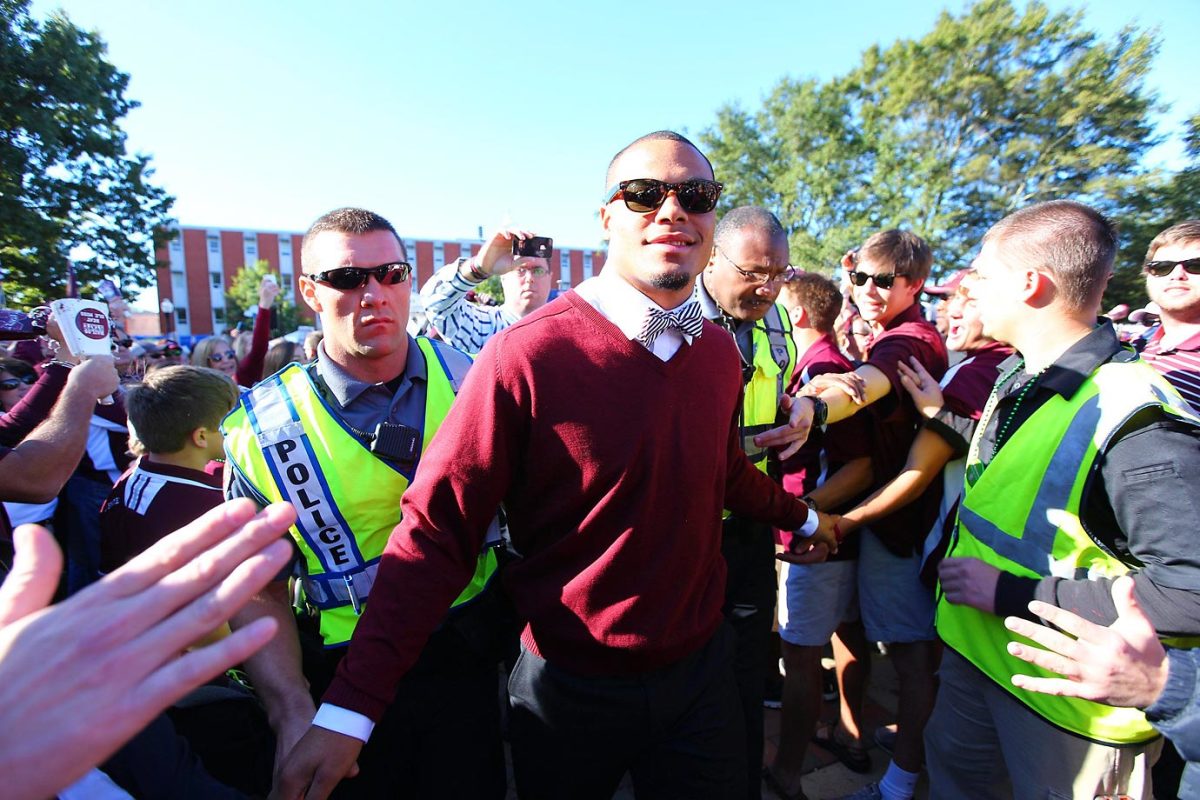
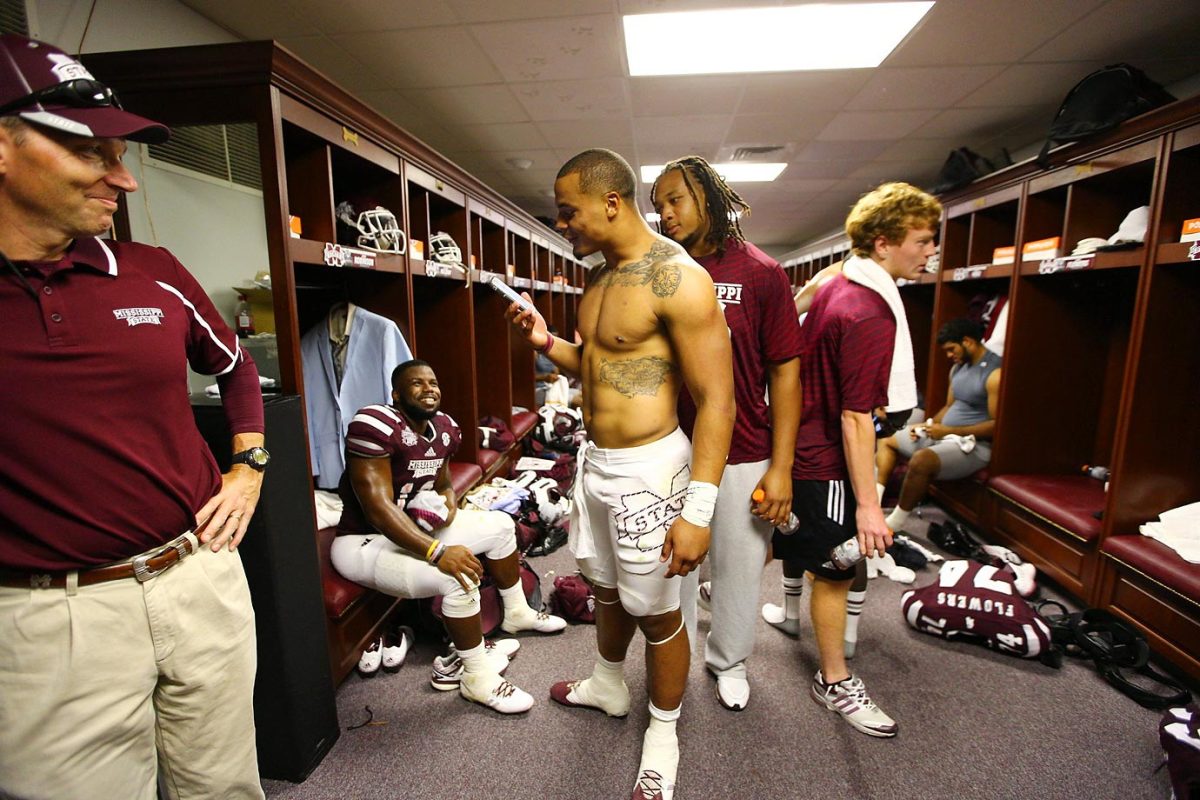
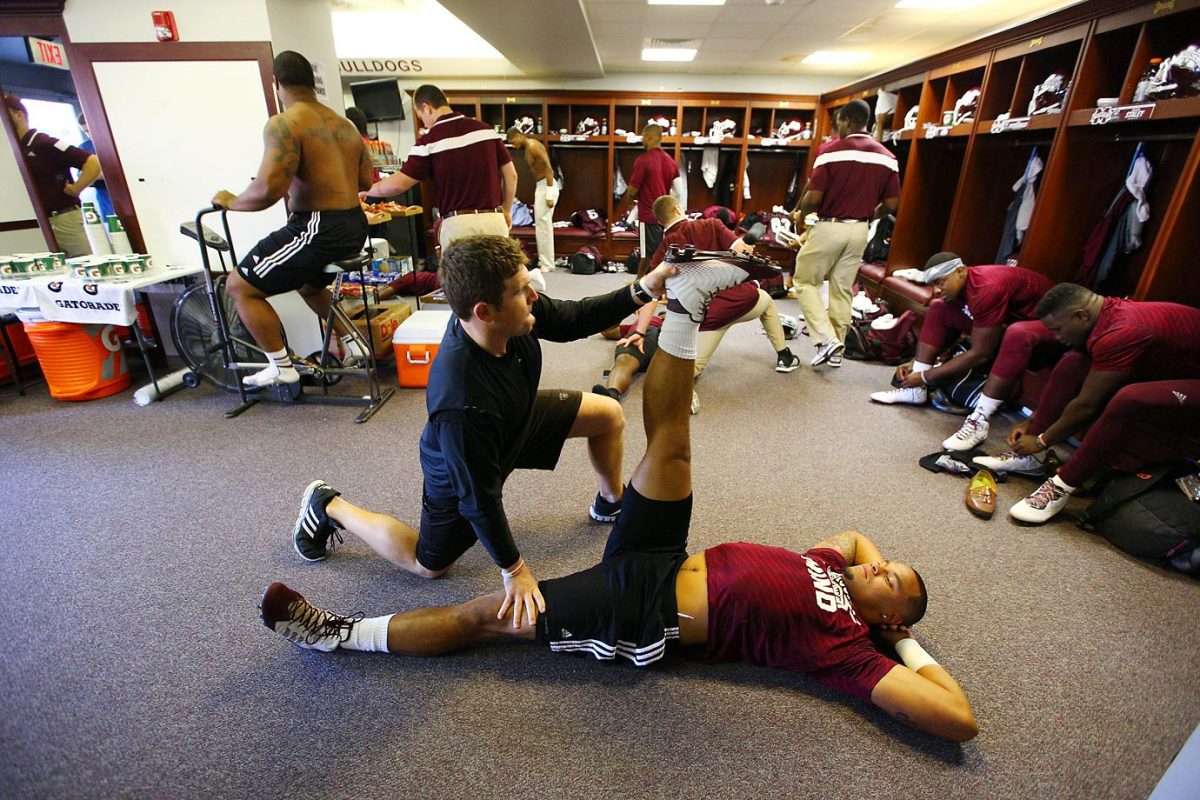
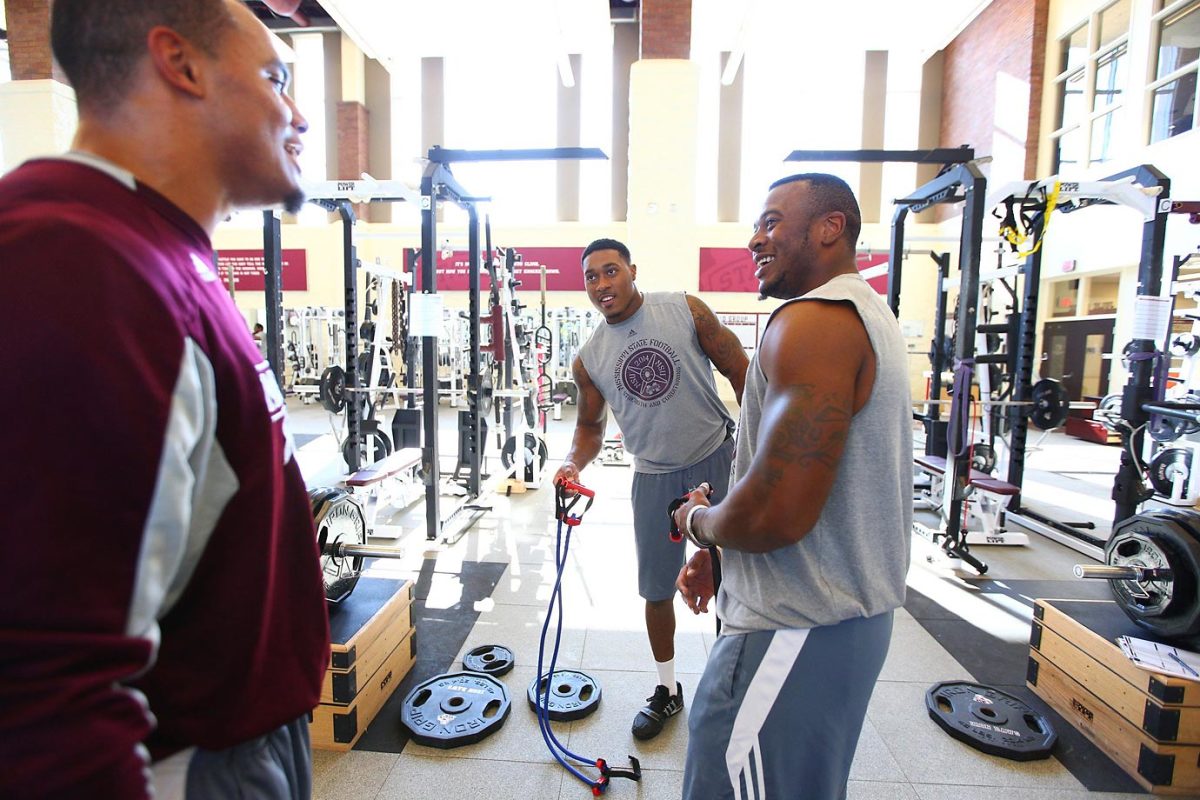
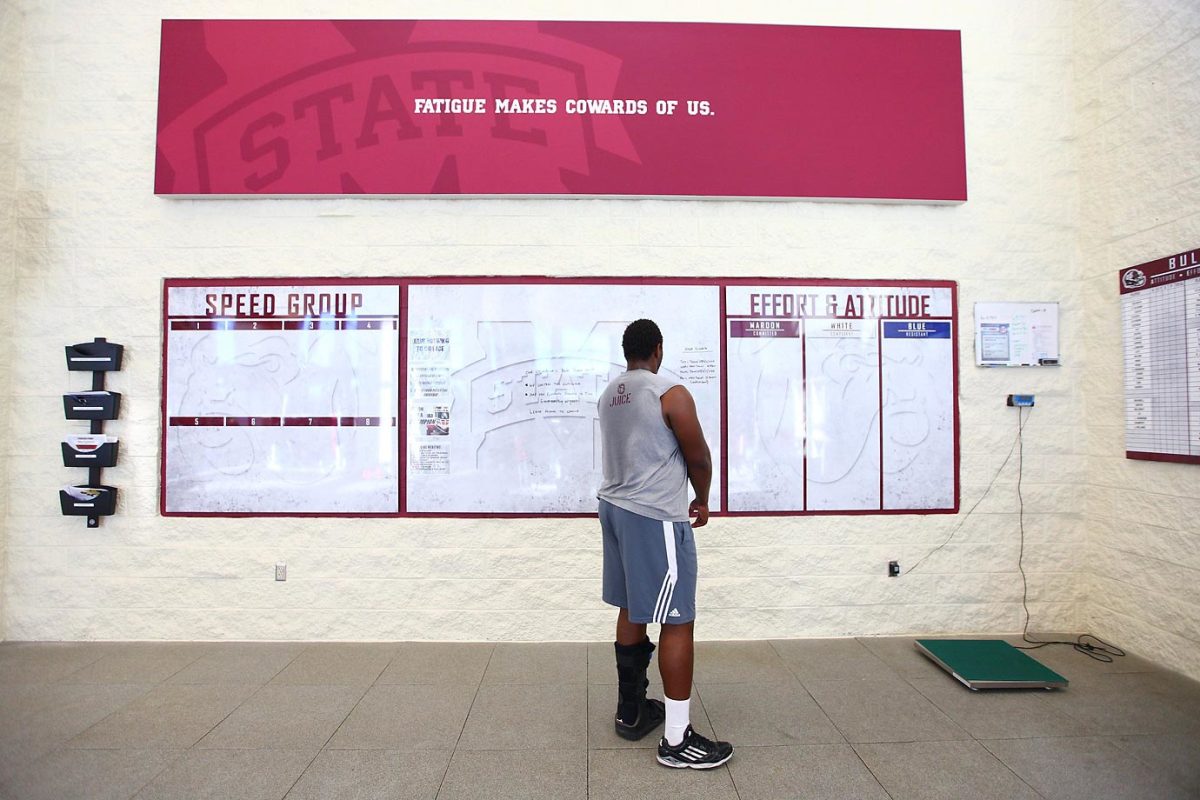
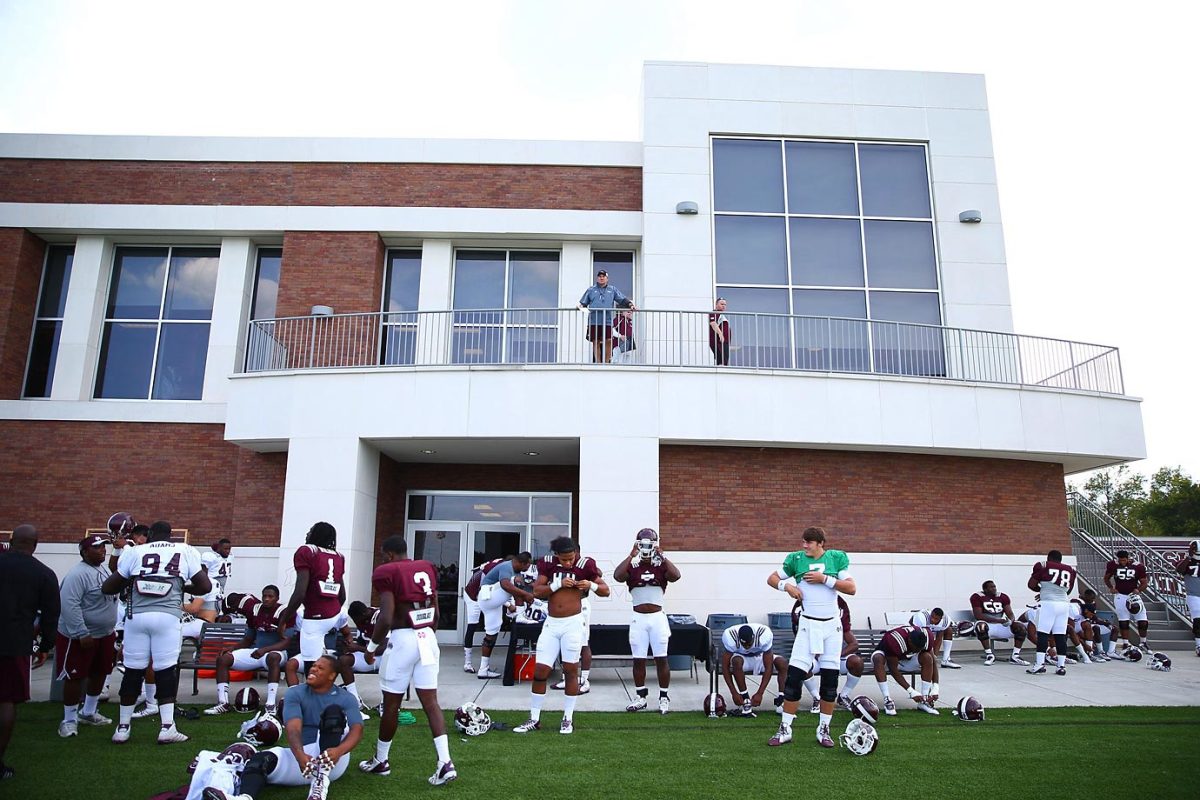
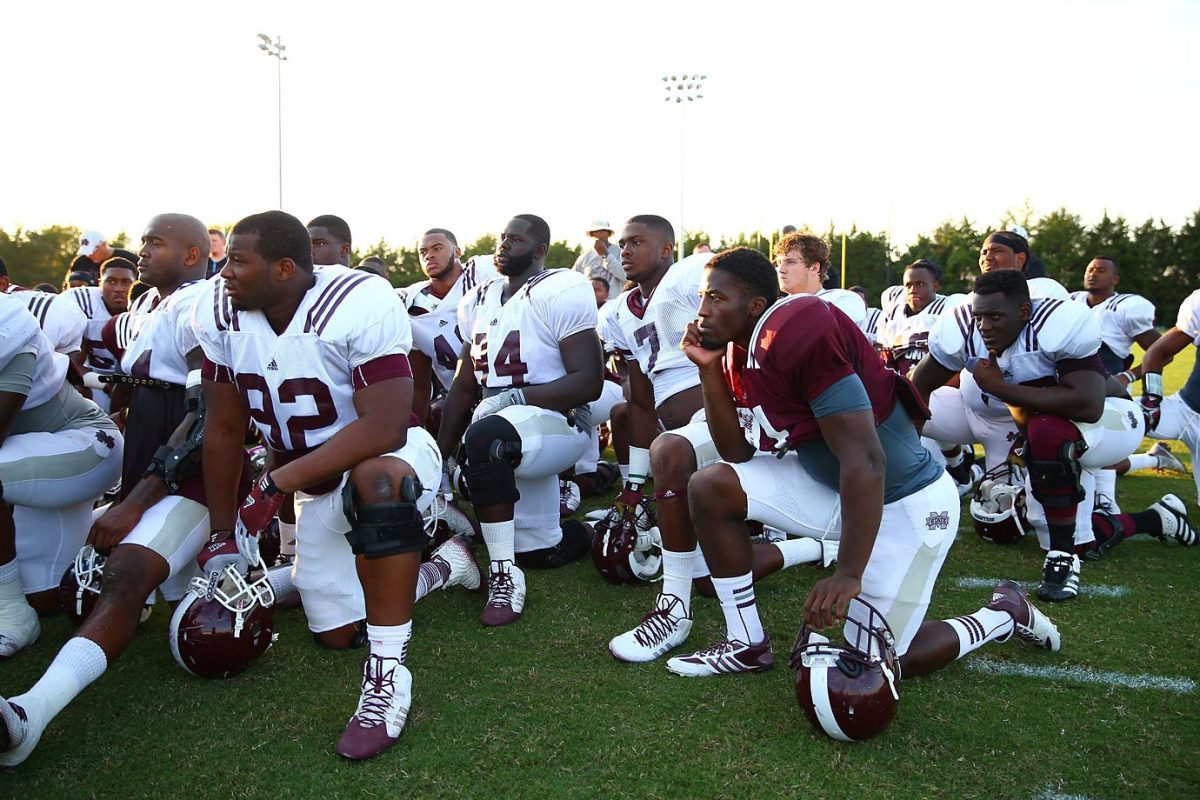
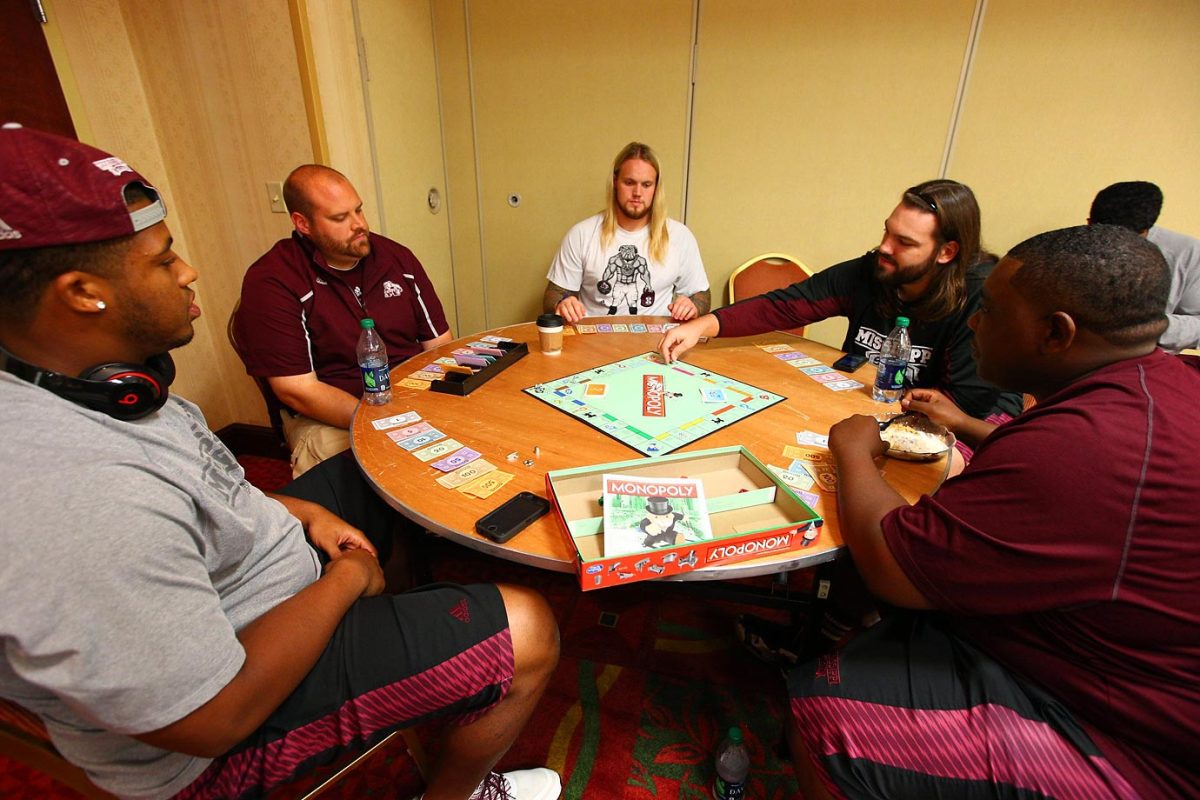
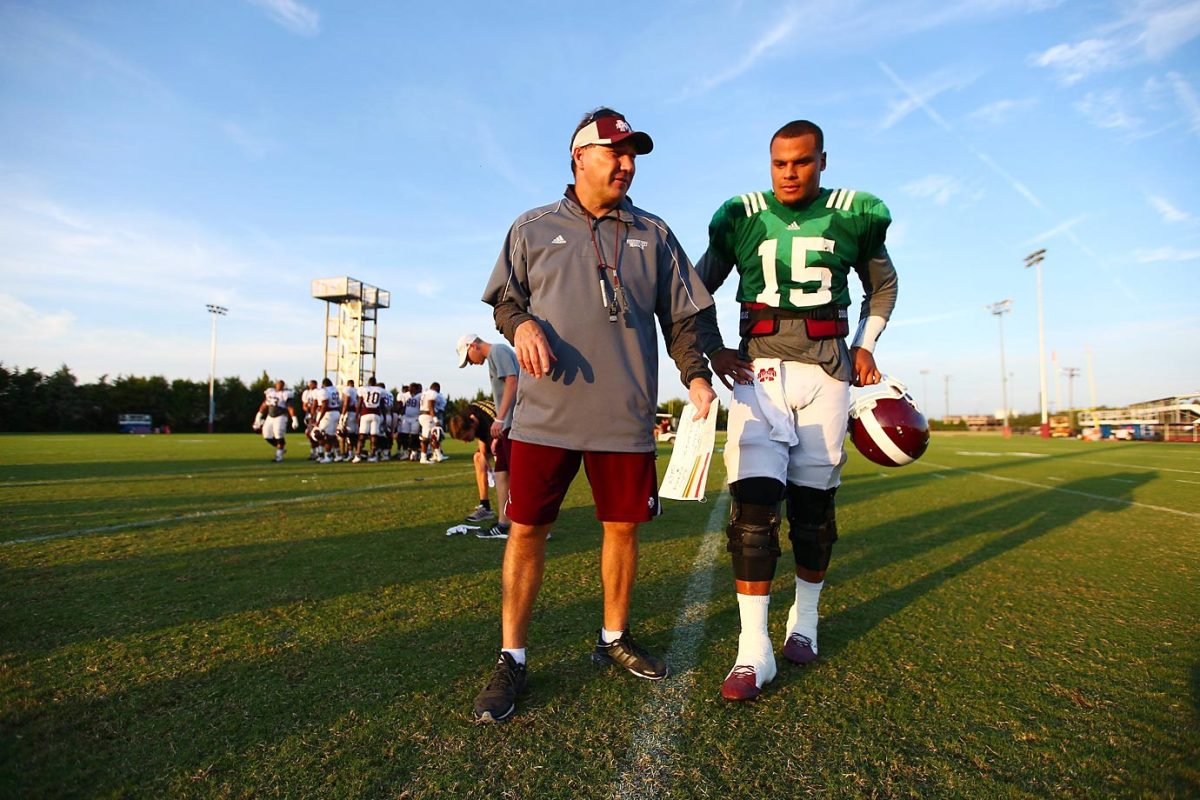
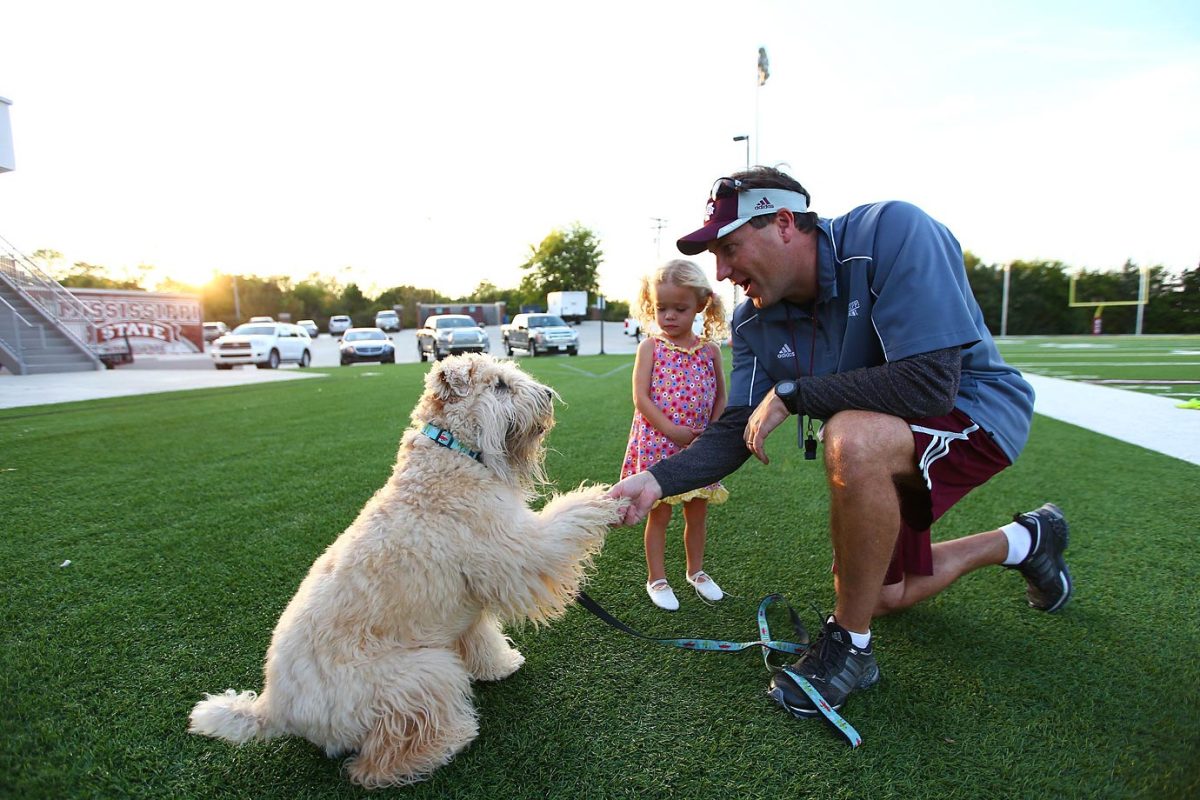
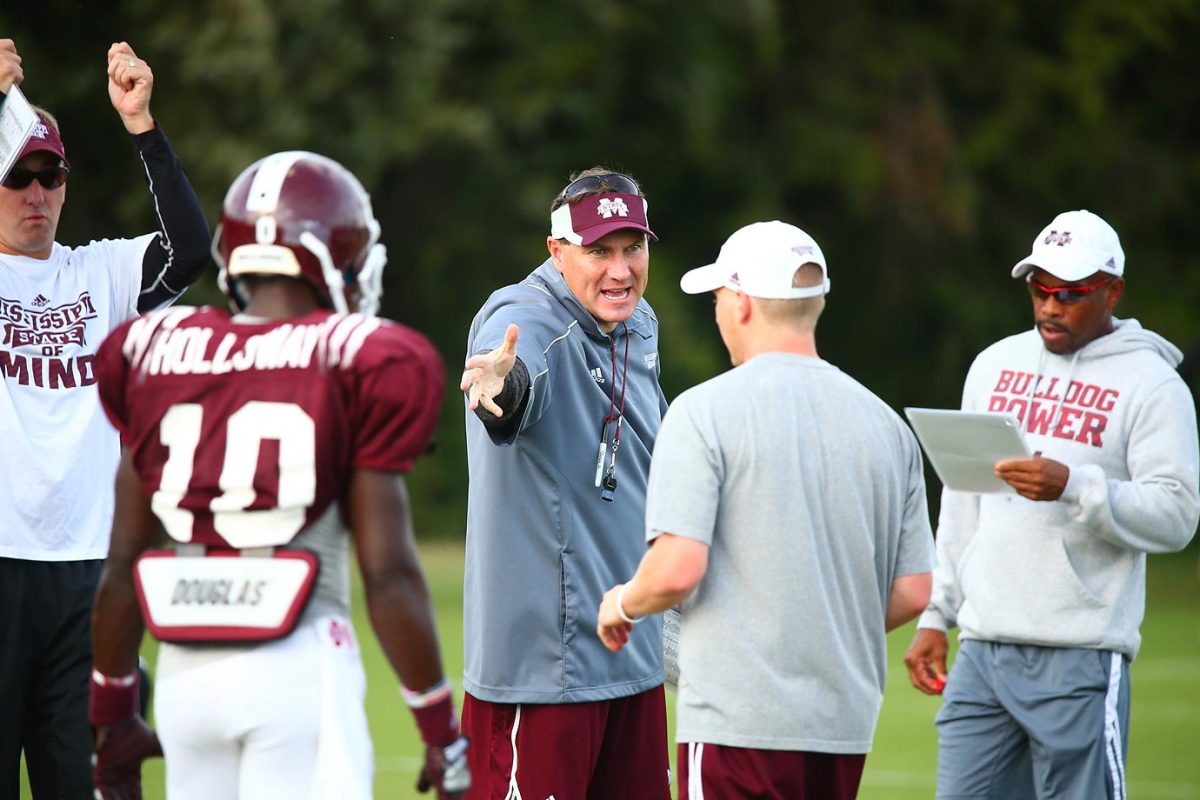
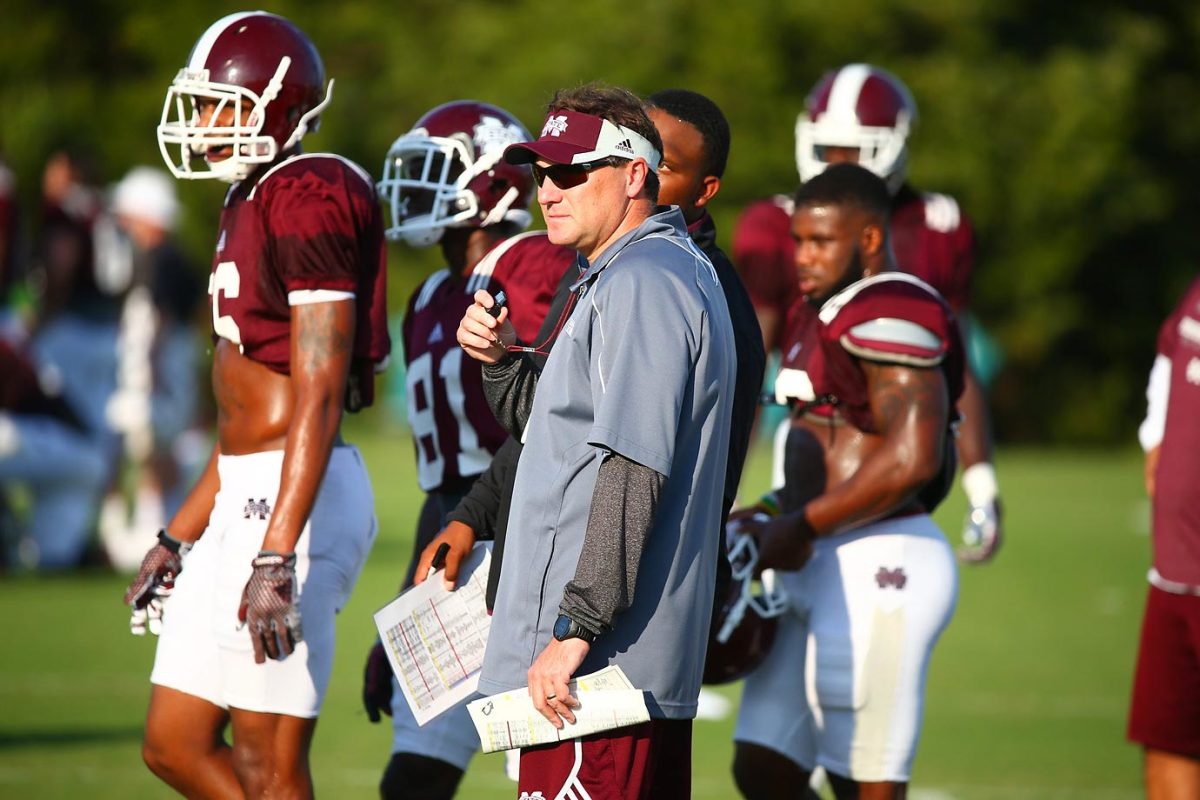
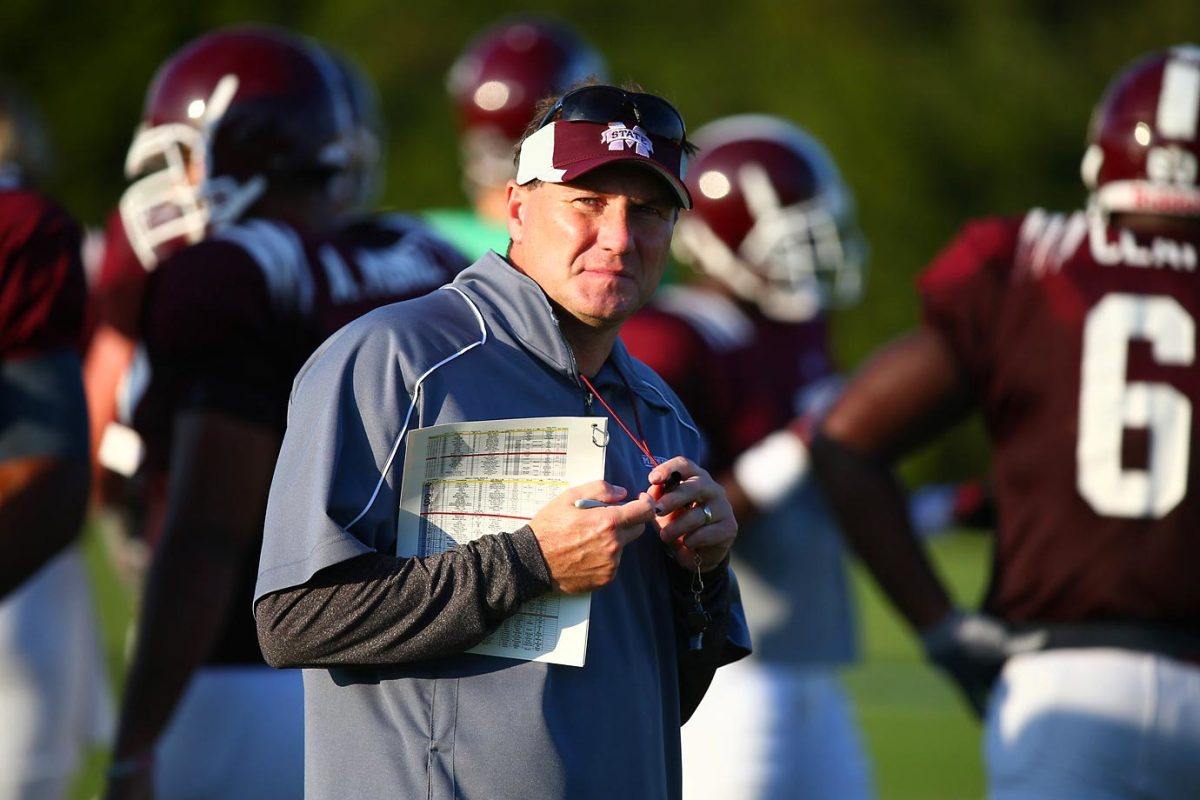
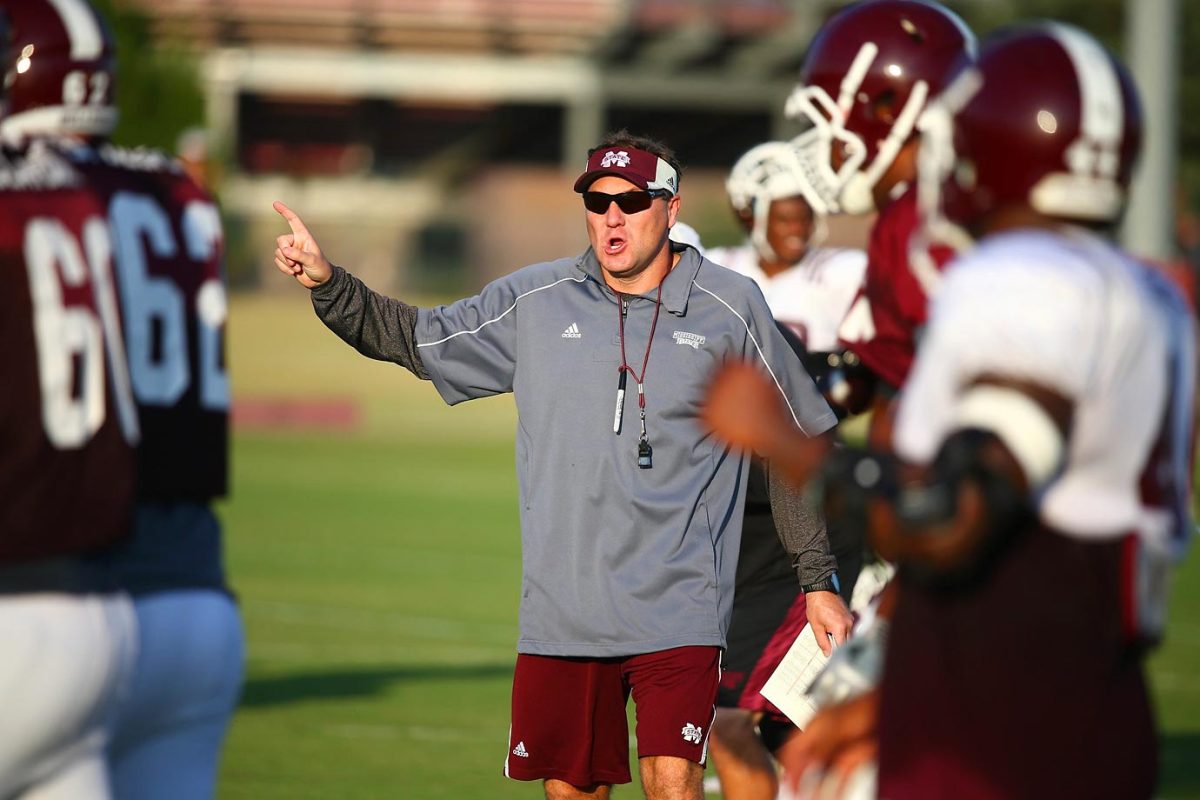
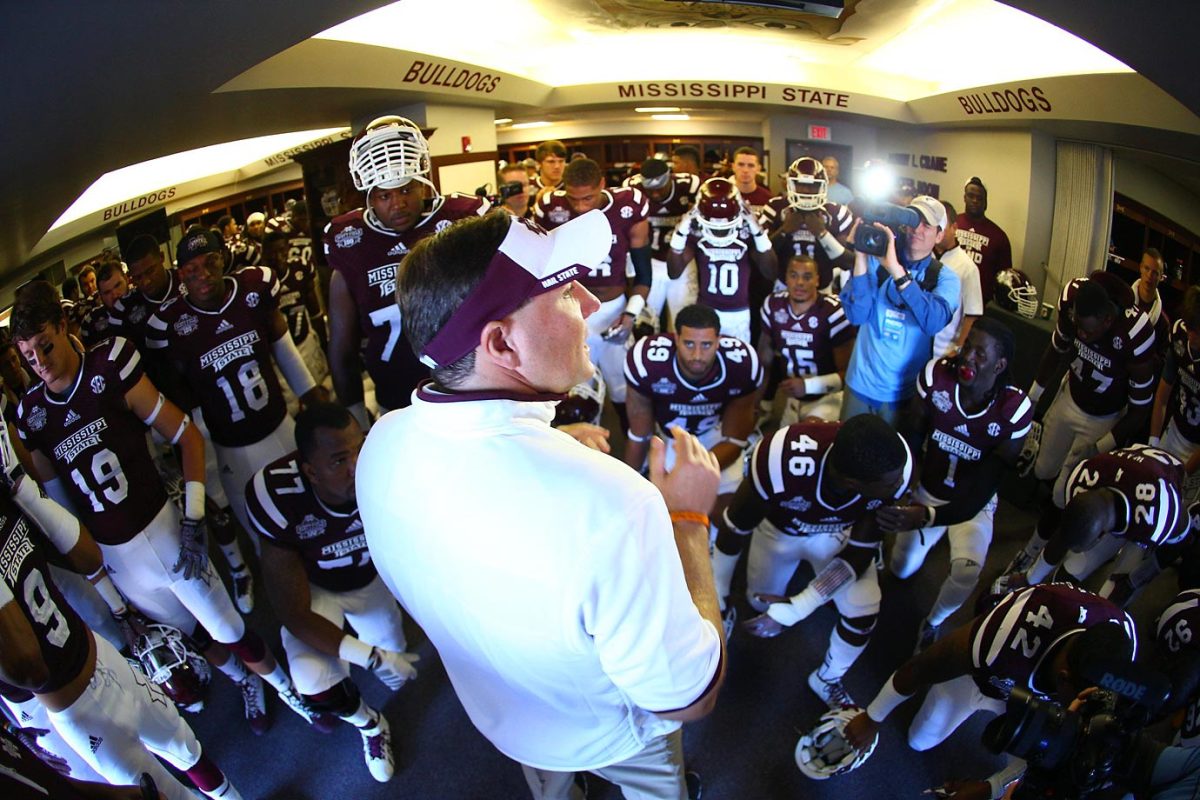
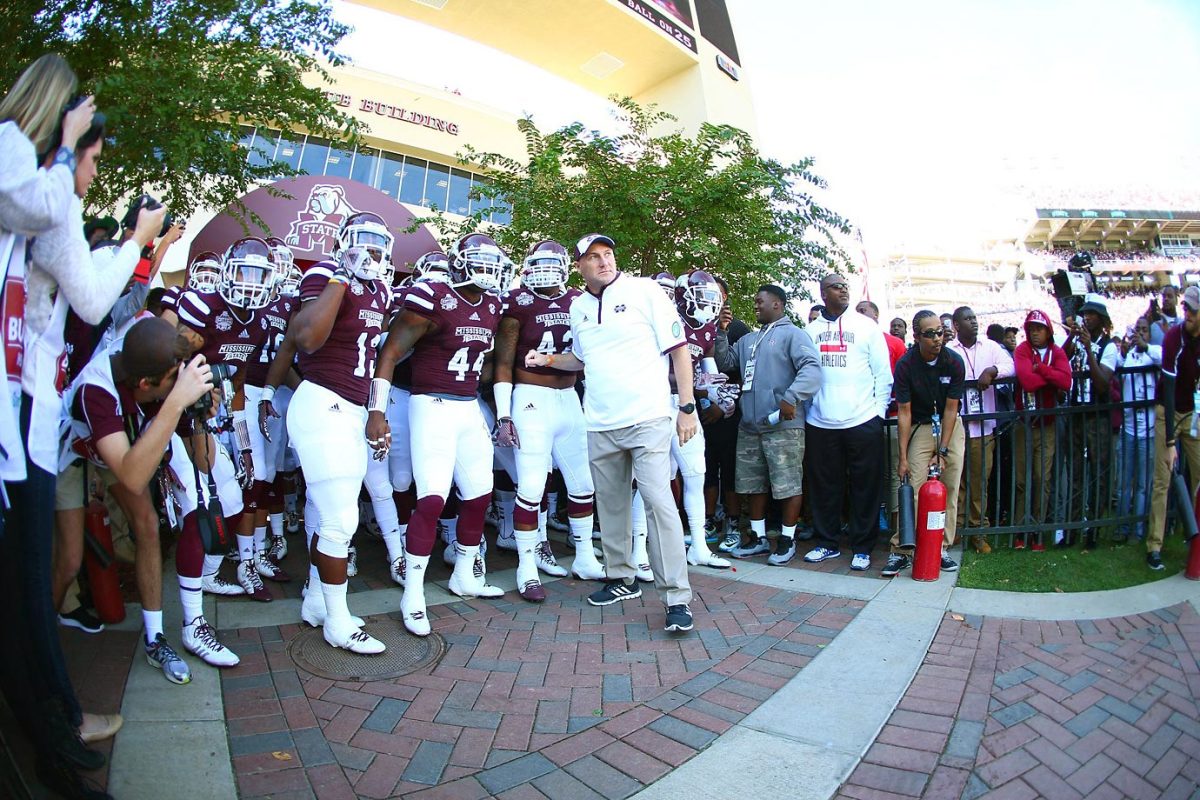
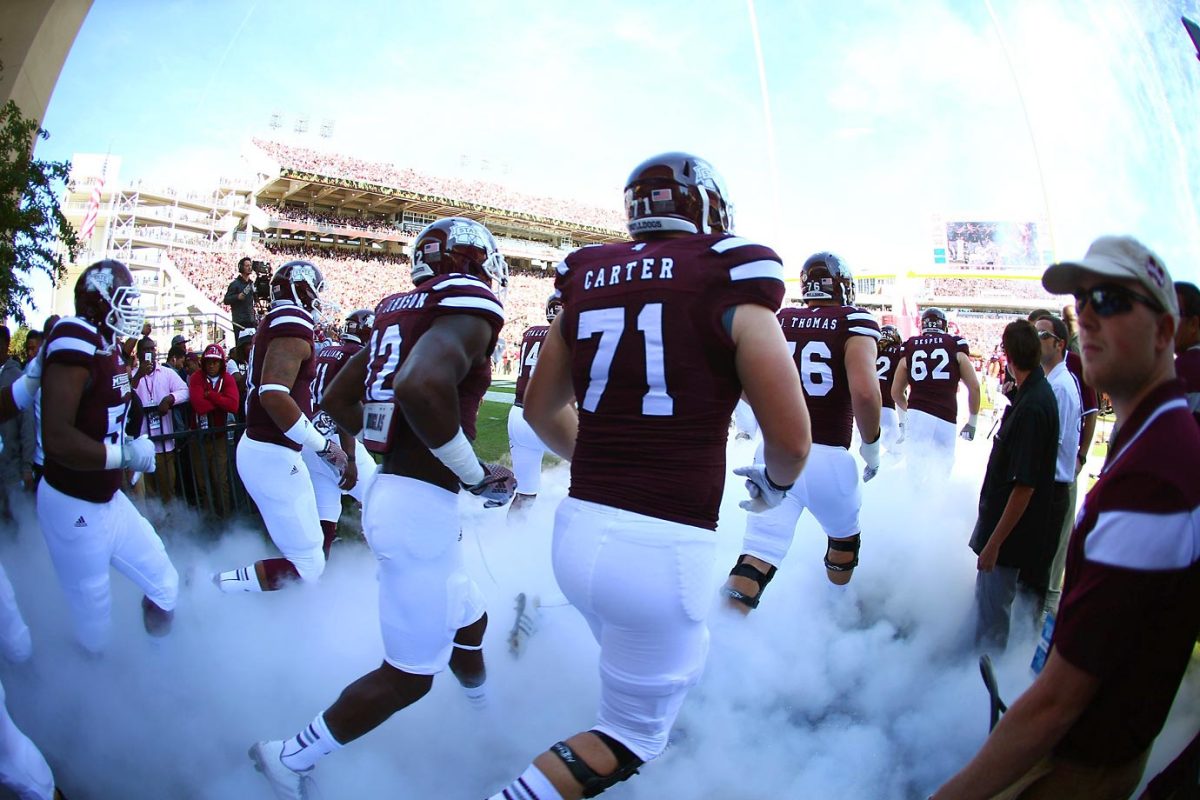
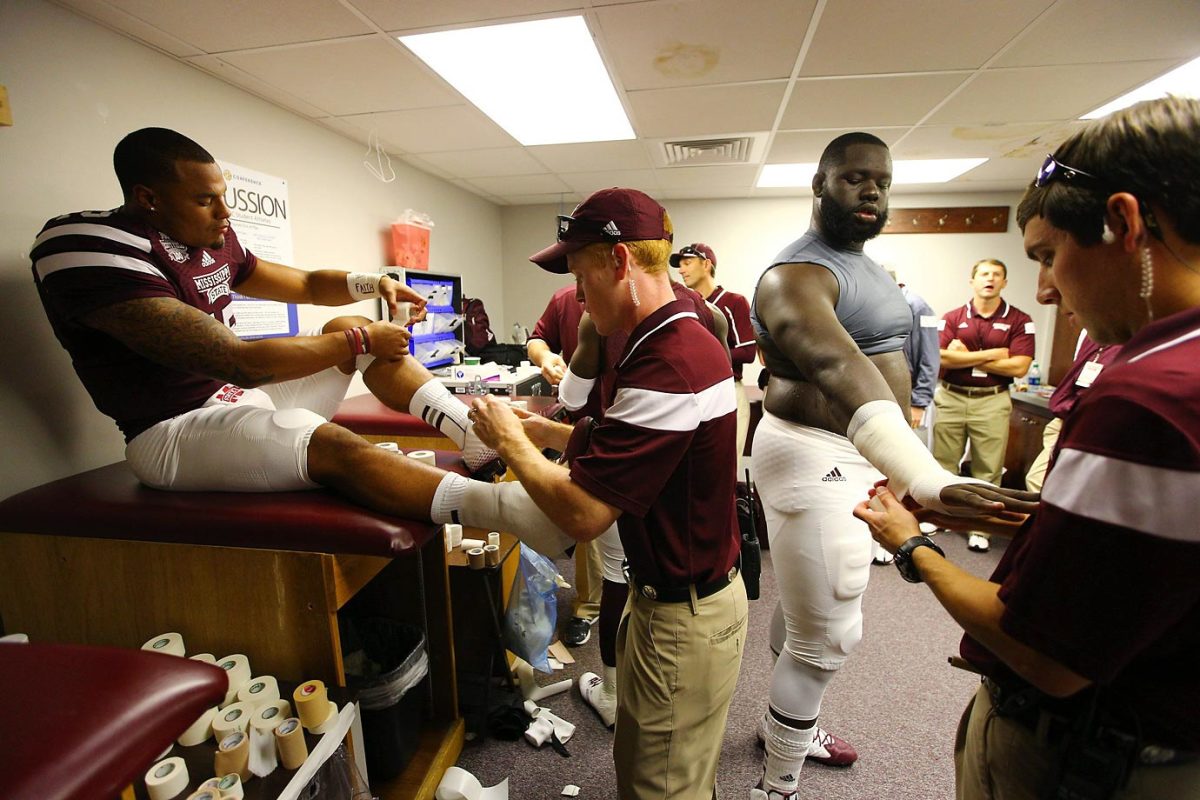
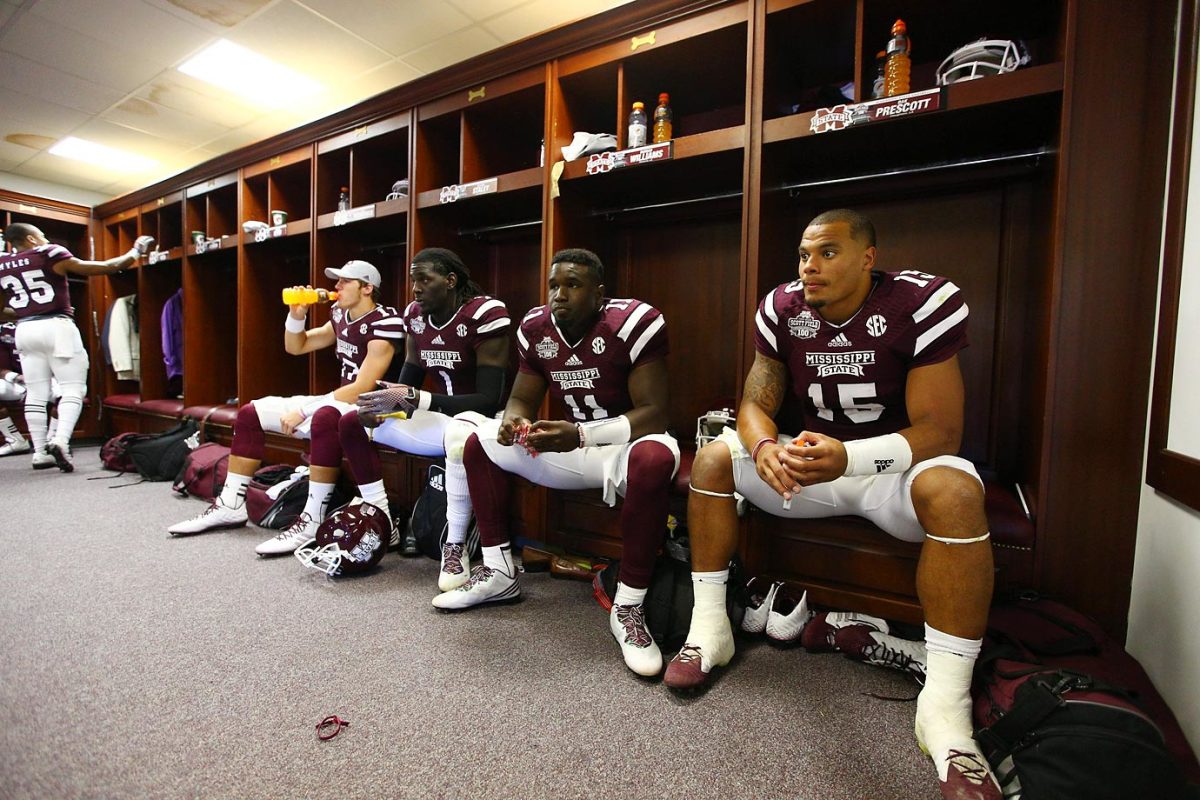
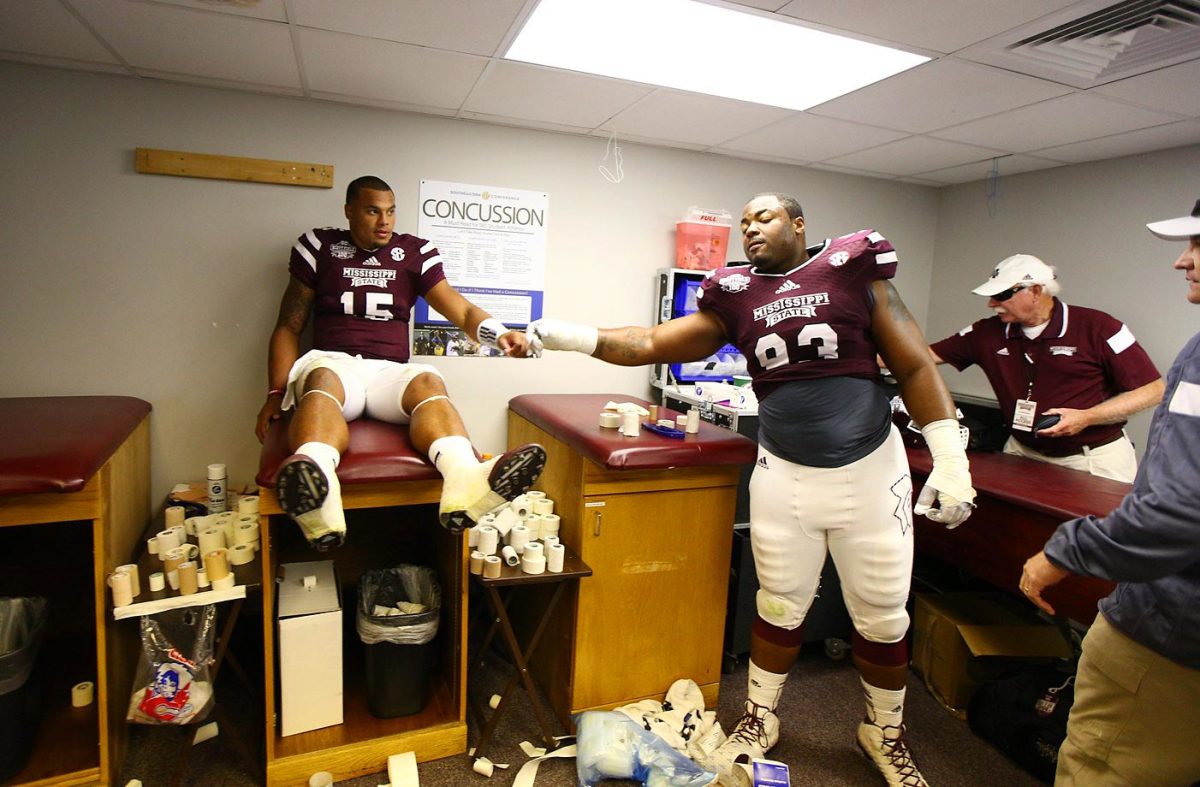
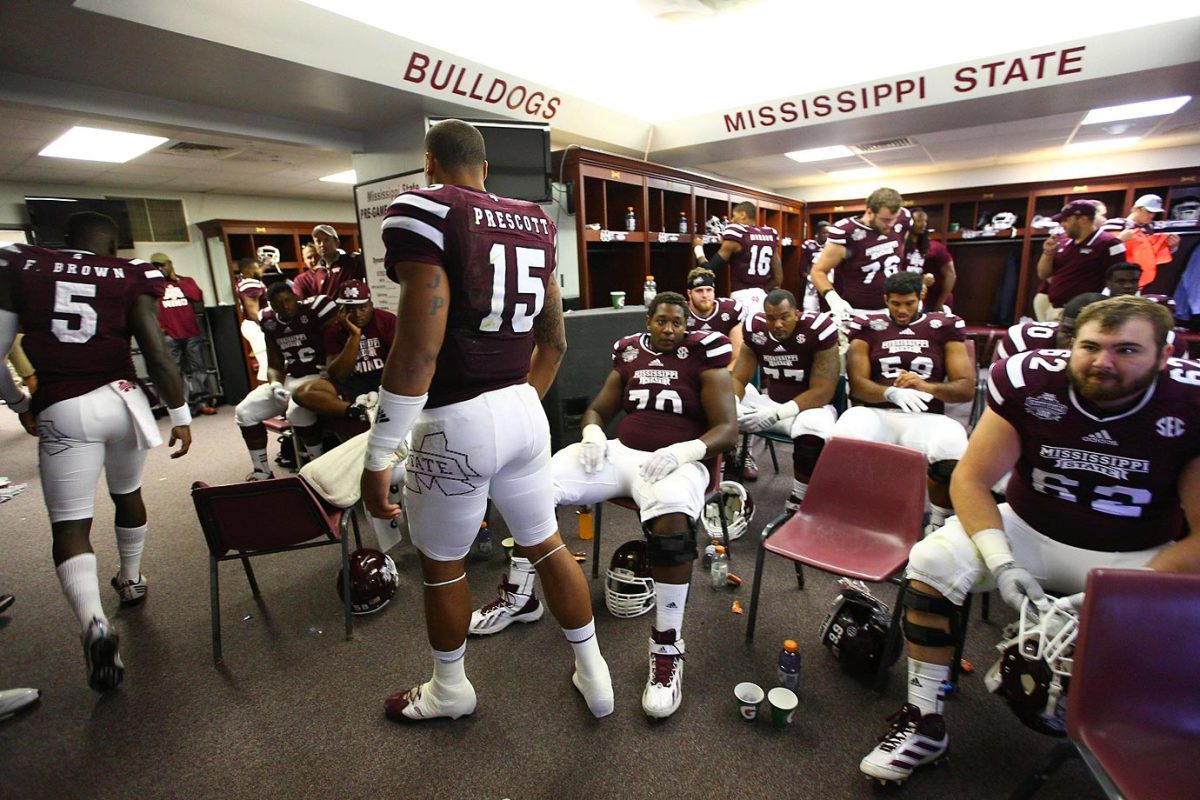
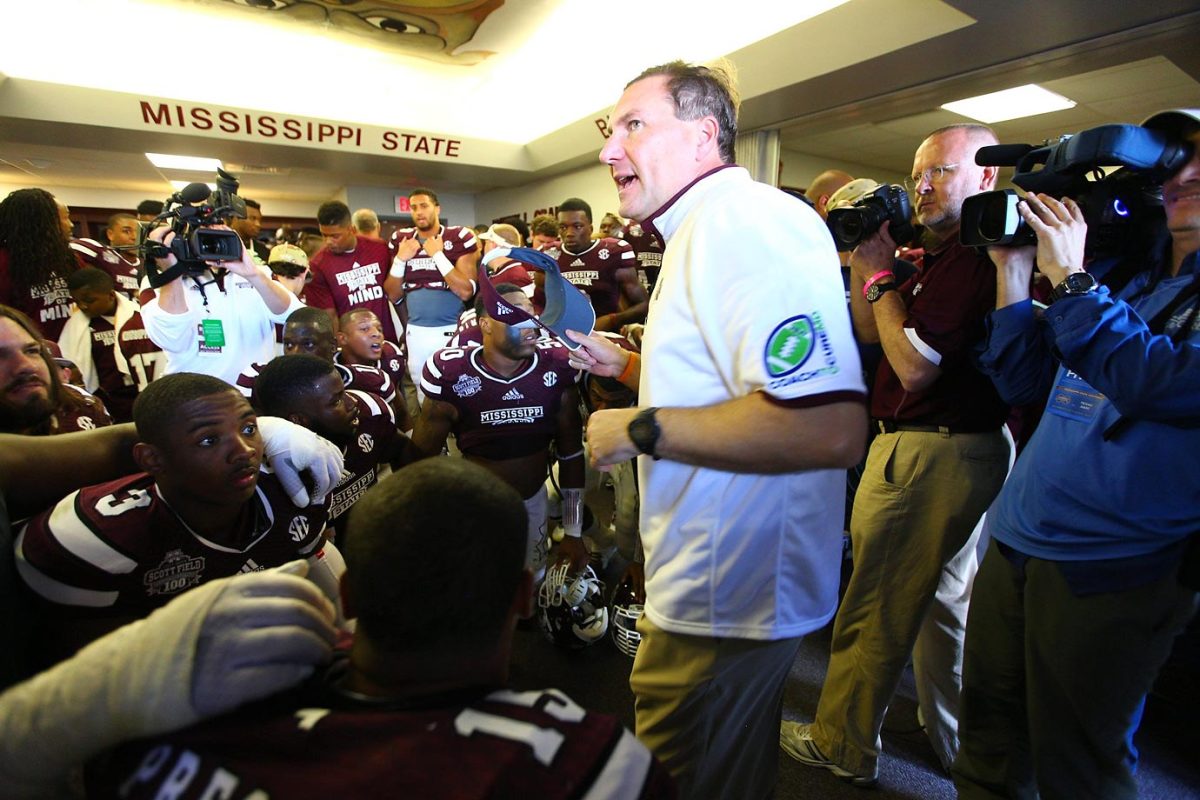
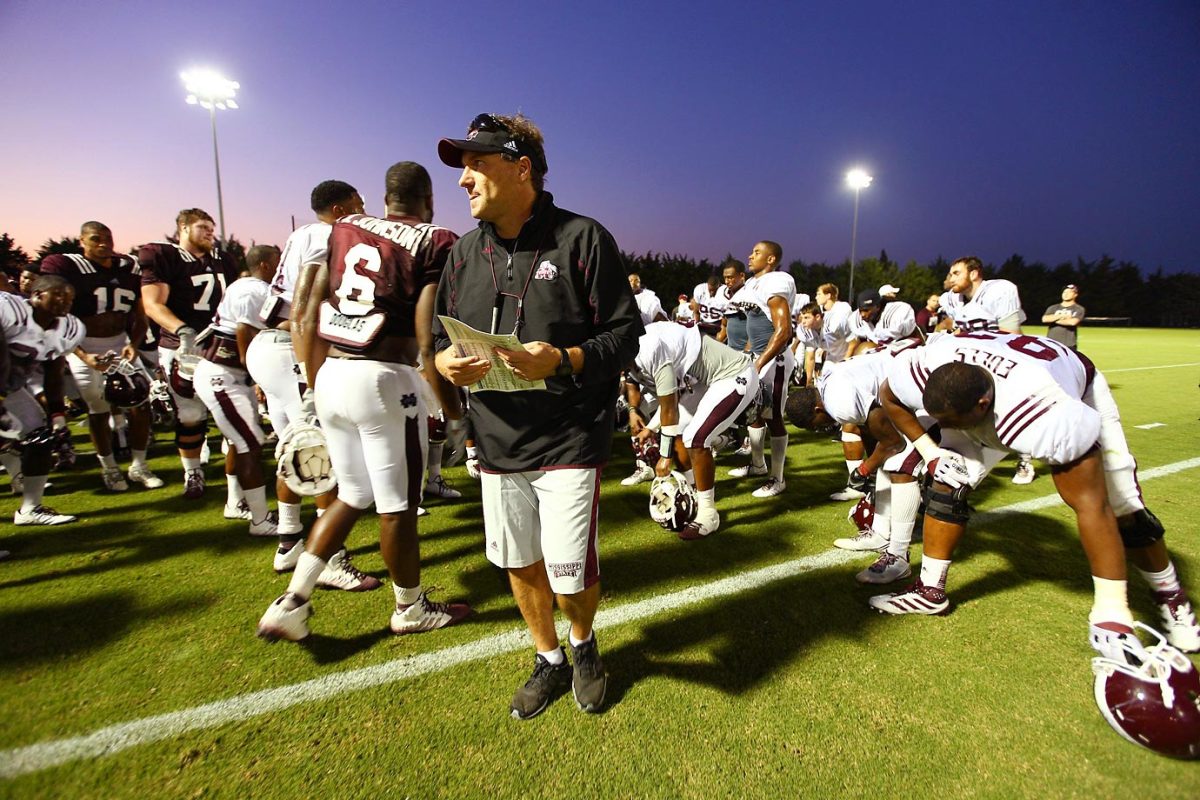
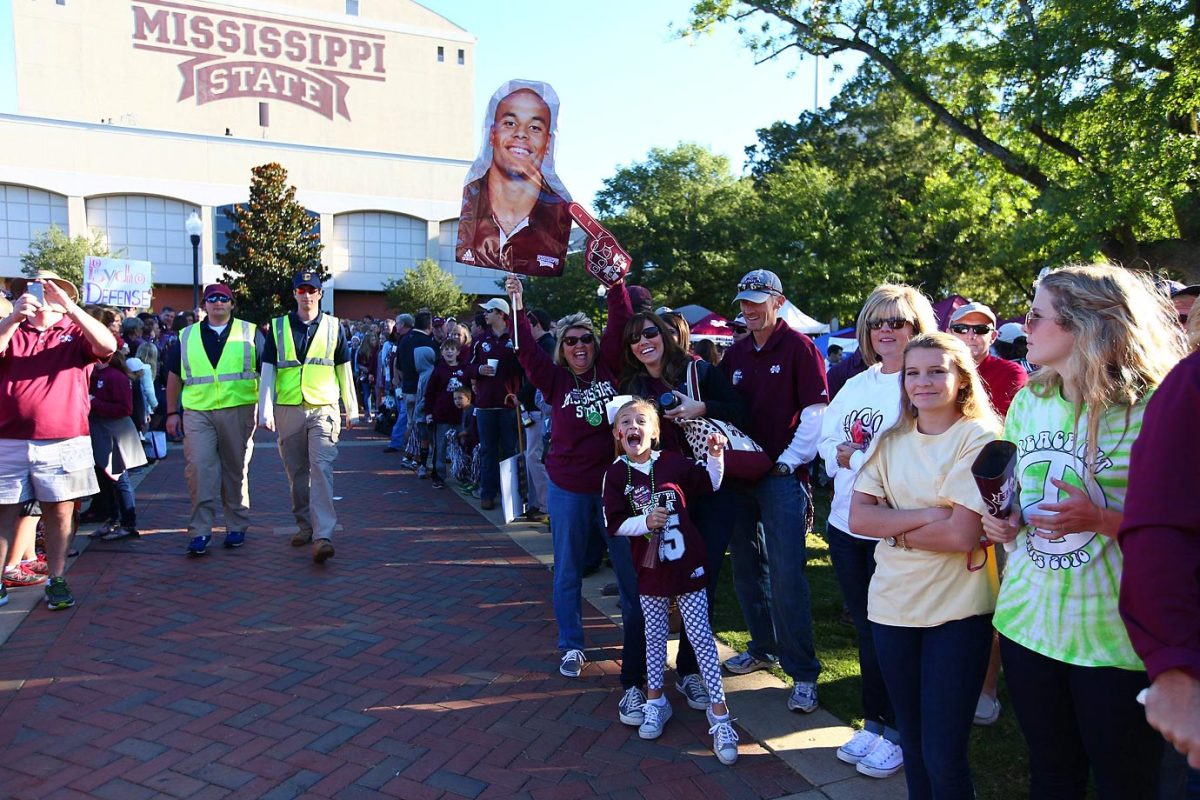
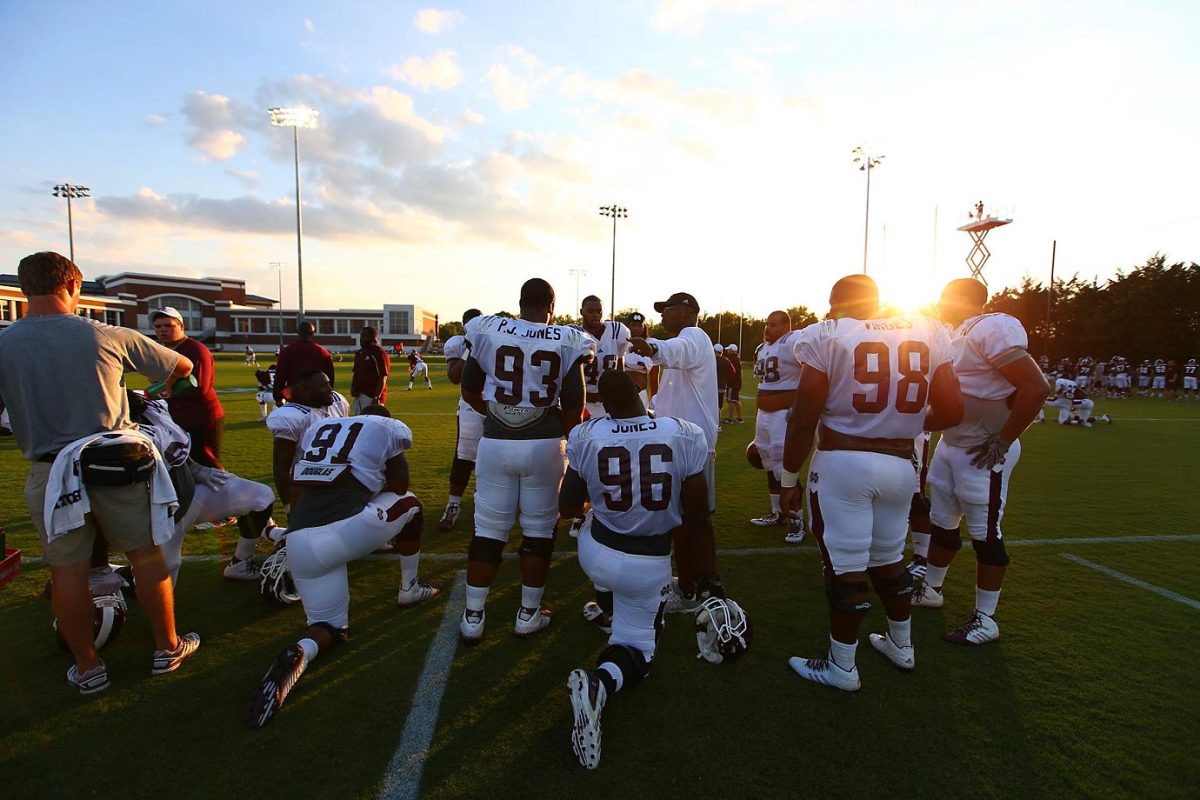
• The heartbreak of losing a three-overtime thriller at Florida last month has weighed heavily on the mind of Kentucky second-year coach Mark Stoops. But after Stoops finally got that signature SEC victory against South Carolina, 48-35, he pointed back to the The Swamp. “It helped us win,” Stoops told The Inside Read on Sunday morning. “We grew up that night. The next time we had an opportunity when the pressure was on, we would come through.”
The Wildcats did exactly that after twice rallying from a 14-point deficit Saturday night. Kentucky scored the game’s final 21 points, proving that Stoops can win on the field as well as on the recruiting trail. One service has Stoops’ current class in the top 20 nationally, which would be his second straight. Now that he’s got his signature SEC victory, he needs two more wins for the next step: bowl eligibility.
Stoops acknowledges that what he inherited has been a “real challenge,” one that will get even markedly more difficult after Saturday’s game against Louisiana-Monroe. The Wildcats then play at LSU, Mississippi State at home, at Missouri and host Georgia before closing with road games at Tennessee and rival Louisville.
“There’s a lot of people that bought into what we’re doing,” Stoops said. “We’ve had great commitment from a lot of people. It was nice to deliver. Hopefully it will propel us the rest of the season.”
• It will be interesting to see how much the fallout of the Jameis Winston era potentially impacts Jimbo Fisher’s coaching future at Florida State. Another factor sure to figure into the equation is the recent naming of John Thrasher as the university’s new president.
Thrasher, a Republican, is a member of the Florida Senate and former speaker of the state’s House of Representatives. His lack of experience in higher education spurred considerable opposition from some students and faculty members, but his influence is being depended on to attract much-needed money for the university to expand.
“He’s a politician,” said a person close to Fisher of Thrasher. “All he will worry about is perception.”
FSU officials were already increasingly concerned about the school’s image in light of the public backlash from Winston’s numerous incidents. It was interim university president Garnett S. Stokes and athletic director Stan Wilcox’s decision to extend Winston’s recent suspension against Clemson to a full game less than 24 hours before the contest.
That scrutiny is expected to only increase under Thrasher. A source said that could become a factor for Fisher’s future at FSU, especially if the LSU job opened. “Jimbo’s going to have to deal with all the road kill the guy created,” the source said of Winston. “It’s embarrassing. He’s making a mockery of the entire university.”
•Northwestern is finally doing what its coaching staff has preached. As evidenced by Saturday’s 20-14 upset of Wisconsin, the Wildcats are finishing games after plenty of woes in recent seasons squandering leads in the final minutes. It’s something they also did the week before in a surprising 29-6 victory at Penn State. It’s been an improbable turnaround for Pat Fitzgerald & Co.; the Wildcats have won three straight after opening the season with back-to-back losses.
“We’ve worked to correct mistakes from earlier in the year and it’s paying off,” Northwestern defensive coordinator Mike Hankowitz told The Inside Read. “We’re developing a toughness and an attitude. We’re getting better. That’s the key.”
Hankowitz’s unit surrendered career-high 259 rushing yards to Wisconsin star running back Melvin Gordon, but came up with four interceptions, including three by redshirt freshman safety Godwin Igwebuike. “We felt like if we could make them beat us throwing it we could win that way,” Hankowitz said. “In reality, it kind of got down to that.”
Suddenly, Northwestern is finishing games and has outscored opponents 21-7 in the fourth quarter during its three-game winning streak. It’s one the Wildcats will look to extend Saturday at Minnesota.
“They’re buying into it now,” Hankowitz said. “That’s why we’re winning those games.”
• ELLIS: Mississippi State QB Prescott rises to Heisman lead after Week 6
• Perhaps no player in the country has helped his NFL Draft stock more than Missouri defensive end Shane Ray, who is second in the nation with eight sacks and 11.5 tackles for loss. The 6-3, 245-pound redshirt junior has gone from a second-day pick to a possible Top 10 selection, according to multiple NFL scouts. “He’s pretty damn good,” one NFL scout told The Inside Read. “He’s real sudden and not real long, but he makes a ton of plays for them.”
Ray is the latest in Missouri’s pass-rushing lineage. Last season, he had 4.5 sacks, nine tackles for loss and 11 quarterback hurries, but was overshadowed by Tigers defensive ends KonyEaly and Michael Sam, who were first- and seventh-round picks respectively in last year’s draft.
There was also redshirt senior defensive end Markus Golden, who entering this season had been considered more NFL-ready than Ray. But one scout said that Golden “maybe a tad bit better” than Sam, who is currently on the Dallas Cowboys’ practice squad.
Ray is expected to shine even more during NFL workouts with his 4.44 speed in the 40-yard dash, 41-inch vertical jump and bench press of more than 400 pounds. “He has the goods,” said the scout.
Q&A with East Carolina coach Ruffin McNeill
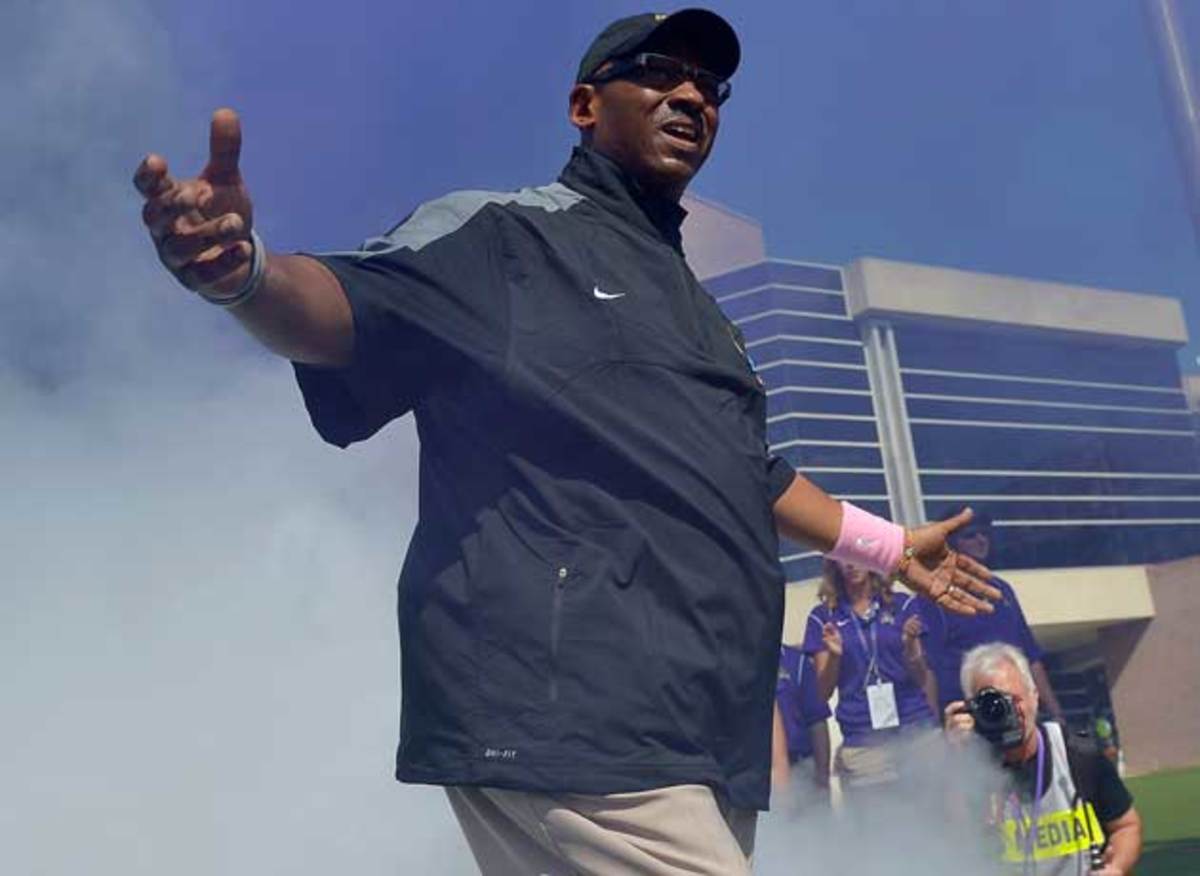
Ruffin McNeill once weighed nearly 400 pounds, had a stuttering problem and wasn’t sure if he would ever be a head college football coach. Now, he weighs half as much, is the author of a new children’s book and is the head coach of scoreboard-breaking East Carolina. His Pirates are currently the highest-ranked team from the Group of Five conferences, which get one automatic berth in the six New Year’s Day bowls. The Inside Read recently caught up with gregarious McNeill about all he’s overcome, his tough nickname and working for Mike Leach.
Your nickname is Tuffy, and you once described yourself “as country as a dozen eggs.” What’s the backstory there?
Well, my dad’s Ruffin Sr. and I was tough. I could fall and take hits. I played sports year-round -- football, basketball, baseball, and track. So they nicknamed me Tuffy. Being from Lumberton, North Carolina, it’s a town that’s halfway between New York and Miami. Not many jobs are available, so we cropped tobacco to earn money, $10 a day, before I got me a real great job inside of a movie theater being an usher. So when I say country as a dozen eggs, it’s all right. It’s cool to be country.
You tipped the scale at nearly 400 pounds in recent years but have lost a significant amount of weight (McNeill had a gastric bypass procedure in 2011). What do you weigh now and how did you do it?
I don’t keep up with my weight, but I’ve lost over a ninth-grade offensive lineman, probably about 200 pounds. I walk every day during lunch. Where I used to live to eat, now I eat to live. If the kids I coach see how hard I work, they’ll do the same. I just stay with it. Erlene, my wife, does a great job of making sure the diet’s there with the food and the discipline. One thing I am is very stubborn and I’m stubborn enough to stay on what the doctors tell me exactly. I’ll do exactly what they tell me to do so I don’t waver off those orders from the team of doctors here that I’ve surrounded myself with. So I just keep plugging away.
You also had a stuttering problem in the past. How did you overcome that?
When I came to East Carolina for college, it was there, but I’ve always spoke in church. My mom and dad are both teachers. My aunts and uncles are educators. The home I grew up in was a boarding home. There was segregation going on at the time. Teachers would come stay at our house and teach and then go back to the North to live after school. I began stuttering toward the end of high school. Most people think that’s a sign of unintelligence, but I knew that was not true. I later had to call signals on defense. It forced me to call signals in 15 seconds. So I had to learn to do it and then I learned to slow down and get a rhythmic pattern about it. There was no such thing as services to help at that time. Just through time and learning how to calm down and get that rhythm even from my church readings that helped. I just keep fighting through it. Every now and then I might get stuck on a syllable, but not much. Just by the blessing of God and I keep practicing.
You’re an endangered species in the Mike Leach coaching tree -- a rare successful, defensive-minded assistant. You realize that, right?
No, not really. I didn’t think about it until just then. I had a great time with Mike at Texas Tech and a lot of the guys on that staff have gone on to become head coaches. I brought Lincoln Riley, who is now my assistant head coach and offensive coordinator. But when I was working for Mike and going against him every day in practice, you saw the offense and how successful it was. You could do things and take advantage. The better kids you got, and the better quarterback you got, you could really have a chance in games. I wanted to be a head coach, but I didn’t know if the college level would be possible at that time with my age. I knew I wanted to settle down and be a high school coach when I got through in college. I was going to get me a little school down by the water and run this offense. I knew I wanted to do it because I faced it. We’ve added some things to it. A little bit different flavor. When Lincoln got here, I said add your flavor to it and he has with the run game, two-back, zone-read type things.
You wrote a children’s book in the offseason entitled “A Little Pirate’s ABCs.” What inspired that and what’s it about?
I had no idea about writing a book but one of the publishers, Diane Taylor from Taylor Made Publishing, approached me. I went back to my raising again, my mom and dad teaching. No matter how hard times were for us, teachers are the most underpaid professionals, especially in North Carolina. As you can imagine, it's terrible, but they never complained. They always bought my brother, Reginald, and I a book, no matter how low funds were. Never ever did they hesitate to buy us a book. That’s one of the most essential tools a young person can have. I began telling my life story and what I believed in. I’m an acronym guy. I tell our kids ABCs boys. That means “avoid bad company.” This first book, there will be some others after this, is about avoiding bad company. Surround yourself with great people. People who understand the difference between right and wrong. People who are high achievers. People who will push you and lead you down the correct road and not be afraid to tell you that’s not right. It all comes from what I believe in, that’s making sure the environment is right. If the environment is right, everything else falls into place. We’re shooting for Thanksgiving and you can buy it presale right now on www.coachruff.com.
During your years at Texas Tech you saw plenty of stat-smashing quarterbacks. Many who were considered products of the Air Raid system. You currently have an accomplished quarterback in Shane Carden. Where does he rank in comparison to those guys and is he any different?
It’s hard to tell. They all were great leaders. They led from the front, academically and off the field as well. But Shane has been one of those, just like those guys, that had to earn his way. Scout team the first year and redshirt. Second year, vying for the backup job, didn’t get it and went back to scout team, where he was tight end, fullback. He didn’t hang his head, didn’t pout, didn’t become a locker room lawyer. Third year battled for it, got injured in the spring. It set him back. Came back in the fall, nip and tuck, but went with the guy that had some reps. Shane still disappointed, but when he got the job took over and hasn’t relinquished it yet. He became the quarterback of our offense that first year and now he’s the quarterback of our team. They all lead the same way. This one is from Texas just like the other guys were. He’s tough as nails. He’s a grown man. I talk to you like I talk to him. Not as a player and coach. He’s already graduated. He’s the first here in the field house and the last to leave.
Assistant huddle
• Joe Conlin tried stopping Chip Kelly’s up-tempo spread offense for three years. It was part of his job as a defensive assistant at New Hampshire, where Kelly was the offensive coordinator from 1999 through 2006. “It was very hard to have any success,” Conlin said. “He always had a way to get the ball where you weren’t defensively.”
Defenses around the Ivy League are about to experience exactly how Conlin felt. Conlin is in his first-year as the offensive coordinator at Yale, where the combination of his pedigree with Kelly and eye-popping statistics could make him one of the most intriguing candidates to move up to the FBS level this off-season. The Bulldogs lead the FCS in scoring offense (51 points per game) and total offense (631 yards per game). Conlin, 35, is calling plays for the first time and he’s handling it with a veteran’s aplomb. Yale beat Army 49-43 in overtime, the first time an Ivy League team has defeated an FBS foe since 1986, and erased a 21-point deficit twice to beat Lehigh 54-43. “It’s been beyond anything we expected,” Conlin said. “If I could bottle and sell it, life would be a lot easier.”
Conlin credits his offensive approach to his time trying to defend Kelly’s offense and playing defensive tackle at Pittsburgh, where he was a three-year starter for then-Panthers coach Walt Harris. Both allowed Conlin to better understand blitz patterns and option responsibilities. “It helped me see things a little bit different from the offensive side of the ball,” Conlin said.
After Kelly left New Hampshire, Conlin remained there for four more years and moved to offensive line coach his last season. He was also an offensive line coach at Harvard in 2011 when the Crimson won the Ivy League title en route to a school modern-era record for points scored. The following season he arrived at Yale, where he was associate head coach, run game coordinator and offensive line coach the last two years prior to his promotion to offensive coordinator this season. The Bulldogs’ attack is less option-based than Kelly’s was at Oregon and more similar to his scheme at New Hampshire that had increased drop-back passing.
Conlin used to talk with Kelly at coaching clinics and when he returns to New Hampshire, but hasn’t had the chance since the Philadelphia Eagles hired him nearly two years ago. “What’s helped is seeing him have success at every level at which he’s been,” Conlin said. “Because then you realize what a great coach you were going up against day in and day out. You don’t feel as badly.”
• Florida International defensive coordinator Josh Conklin’s emphasis on forcing turnovers is evident in games after opponent’s incomplete passes. A Panthers defender almost always scoops up the ball afterward and starts to return it to the end zone. That’s required in practice whenever the ball hits the ground, as if it were a turnover. “It’s amazing how much that carries over,” Conklin said.
Conklin can attest because his aggressive 4-3 defense ranks first in the FBS this season in forcing turnovers (21), including four in last Thursday’s 38-10 rout of rival Florida Atlantic. All have come after the Panthers’ embarrassing 14-12 season-opening loss to FCSBethune-Cookman, a defeat many thought spelled doom for second-year coach Ron Turner, whose team is now 3-3.
The turnover-forcing mentality is one that Turner learned from his NFL days working with Lovie Smith, whose Bears defenses were among the league’s best at it. During spring and preseason practices this year, each time a Florida International defensive player scooped up the ball and returned it, he also received a point towards his daily grade from the coaches.
“It really turned into kind of a competition,” Conklin said. “The ball would be on the ground out of bounds and guys would race 10, 15 yards to try to get a point.”
As part of that turnover-forcing mentality, Panthers defenders also received points for what Conklin calls “dig” attempts, their efforts to strip the ball during spring and preseason practices and now games. More than half of the team’s forced turnovers have been via fumbles (13).
The 35-year-old Conklin knows the importance of forcing turnovers firsthand from his one ill-fated season as a safeties coach at Tennessee in 2012, Derek Dooley final one in Knoxville. That season, the UT defense was among the nation’s worst in takeaways. Just over a month later, Turner hired Conklin at the recommendation of his son, Cameron Turner, who is the Panthers’ quarterbacks and wide receivers coach. The two worked together for one of Conklin’s two seasons as defensive coordinator at The Citadel.
Florida International’s takeaways this season have already exceeded those under Conklin last season (14). “The whole thing now is just trying to sustain it a little bit,” Conklin said. “Hopefully we can do that.”
• Who has put up the most complete game against Mississippi State this season? It wasn’t LSU or Texas A&M, which struggled for long stretches before scrambling to make the score close in the final few minutes. It was Alabama-Birmingham, which has quietly put together an impressive turnaround under first-year coach Bill Clark.
The UAB offense has shined, thanks to 38-year-old Bryant Vincent, a former high school coach quickly making a name for himself in his first season as a collegiate play-caller. “There’s not a whole lot of difference to be honest with you,” Vincent said of high school and college.
After piling up 591 yards of offense in Saturday’s 42-39 win at Western Kentucky, Vincent’s unit ranks 21st nationally in total offense (498.4 yards per game). His goal is a minimum of least 90 offensive snaps per game.
Not surprisingly, Vincent’s offensive influences are all former high school coaches -- Auburn’s Gus Malzahn, Baylor’s Art Briles and Clemson OC Chad Morris. He got to know Malzahn while both were high school coaches, Morris through Clemson graduate assistant Joe Craddock, and Briles during a visit to Waco in March arranged by a mutual friend. It was during the Baylor trip that Vincent honed in on the up-tempo pace that he previously hadn’t employed as a high school play-caller.
“Now as soon as the ball is put down,” Vincent said, “we try to snap it.”
Prior to his arrival at UAB, Vincent was the quarterbacks coach for three seasons at South Alabama. He’s got 12 years of high school experience, which includes a Class 5A state championship he won in his fourth and final season as coach at Spanish Fort (Ala.) in 2010.
Malzahn, Morris and Briles also won state high school championships. “Those guys have really broken the mold,” Vincent said. “Maybe seven or eight years ago, it was kind of frowned upon. You look at those guys, and now I think it’s kind of almost trendy.”
• Former Texas Tech defensive coordinator Matt Wallerstedt has been reunited with Louisiana-Lafayette coach Mark Hudspeth. The 48-year-old Wallerstedt was hired by Hudspeth to be a defensive consultant late last month. Wallerstedt was Hudspeth’s defensive coordinator at North Alabama in 2003, a year in which they went undefeated in regular season before losing in the NCAA Division II semifinals.
Wallerstedt said Hudspeth reached out to him Sept. 18, the day he resigned. “He told me I know you’re a good person and a hell of a ball coach, I don’t know what went down, but I’d like for you to come down,” Wallerstedt told The Inside Read. “We could use your help.”
Wallerstedt’s first game with ULL was its 34-34 win over Georgia State on Saturday, snapping a three-game losing streak. Hudspeth is paying him a salary as well as putting him up in a hotel and providing him a car. Wallerstedt said he initially had reservations because his wife, Josie, and their son, who is a ninth-grader, are still in Lubbock, but she supported him going to Lafayette.
“She was really strong and encouraged me that there’s no better way to show your profession that you’re not doing drugs or boozing,” Wallerstedt said. “She wanted me to jump right back in it.”
ULL has been one of the nation’s worst defensively during its sluggish 2-3 start. James Willis is the current defensive coordinator, a position he has held for two seasons. “I’m just another set of eyes,” Wallerstedt said. “Another voice. Another sounding board.”
Willis too resigned as defensive coordinator at Texas Tech after the regular season in 2010, his lone year at the school, and later pleaded guilty to domestic assault. His unit this season is 104th nationally in total defense (458 yards per game) and 101st in scoring defense (35 points per game). “That damn place has been a bone yards for DCs,” Wallerstedt said of Texas Tech with a laugh.
Wallerstedt’s surprising resignation last month came on the heels of an ESPN.com report that he had been sent home from Texas Tech’s team facility for allegedly being under the influence of an unknown substance. It also occurred less than a week after the Red Raiders’ defense was gashed for 438 rushing yards in an embarrassing 49-28 home loss to Arkansas.
At the time, Wallerstedt told The Inside Read in a text, “Don’t believe all the rumors!!”
Coach's kitchen
After Nebraska coach Bo Pelini watches his kids compete in baseball, basketball, softball and gymnastics, he likes to take them out for pizza. He and his wife, Mary Pat, usually end up taking their son and two daughters to Pelini’s favorite restaurant in Lincoln, Dino’s Eastside Grille. He recommends ordering the sports bar’s New York-style pizza topped with sausage and mushrooms.
The pizzas are cooked in a brick oven and known for their crispy crust and authentic Italian taste. Trust Pelini, who’s Italian and considers himself an expert on the cuisine (he also recommends Campisi’s in Dallas near SMU, and Gino’s Restaurant in Baton Rouge).
Besides the food, Pelini likes the atmosphere of Dino’s, which has plenty of televisions.
Said Pelini, “It’s a laid back, family place.”
